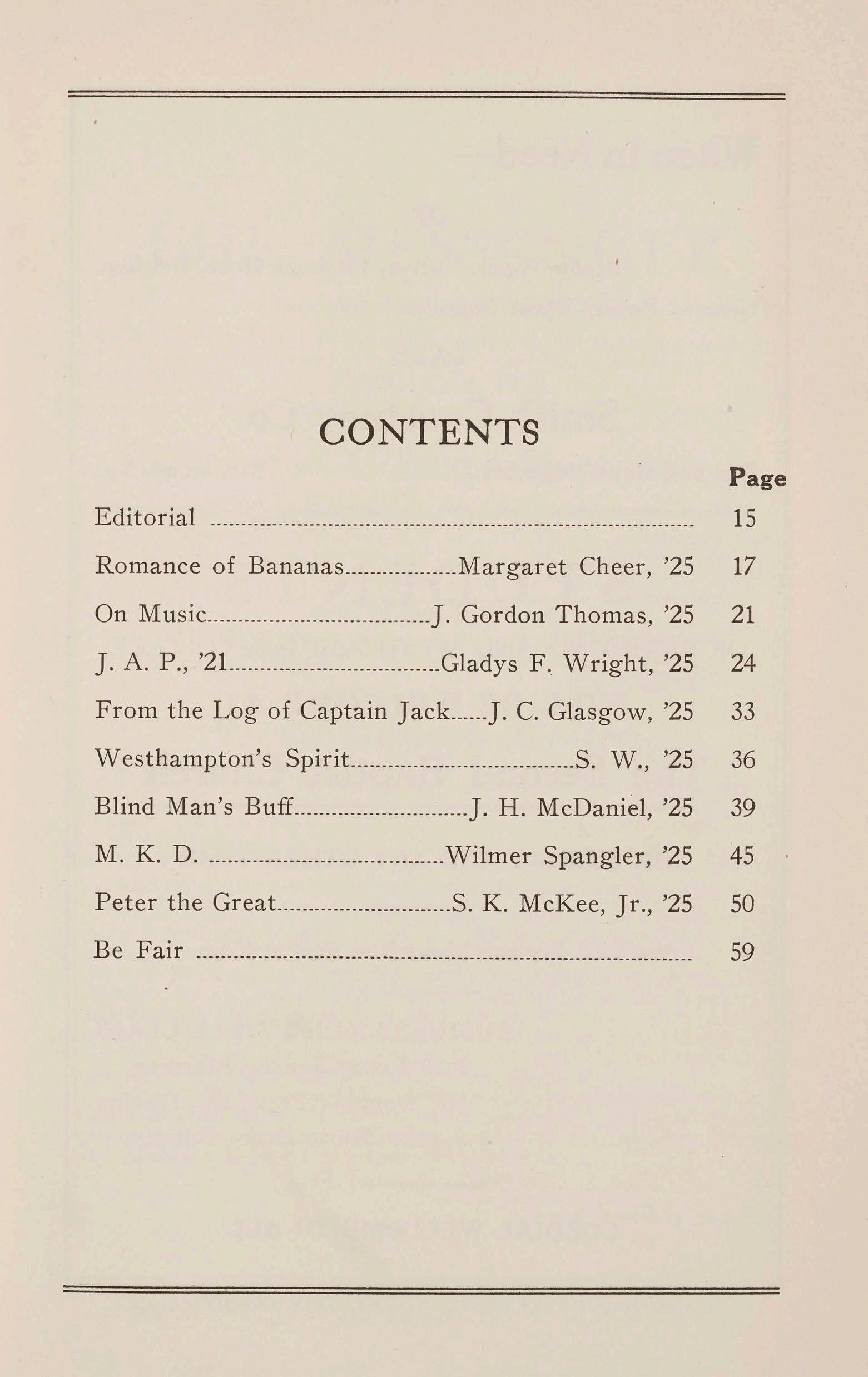
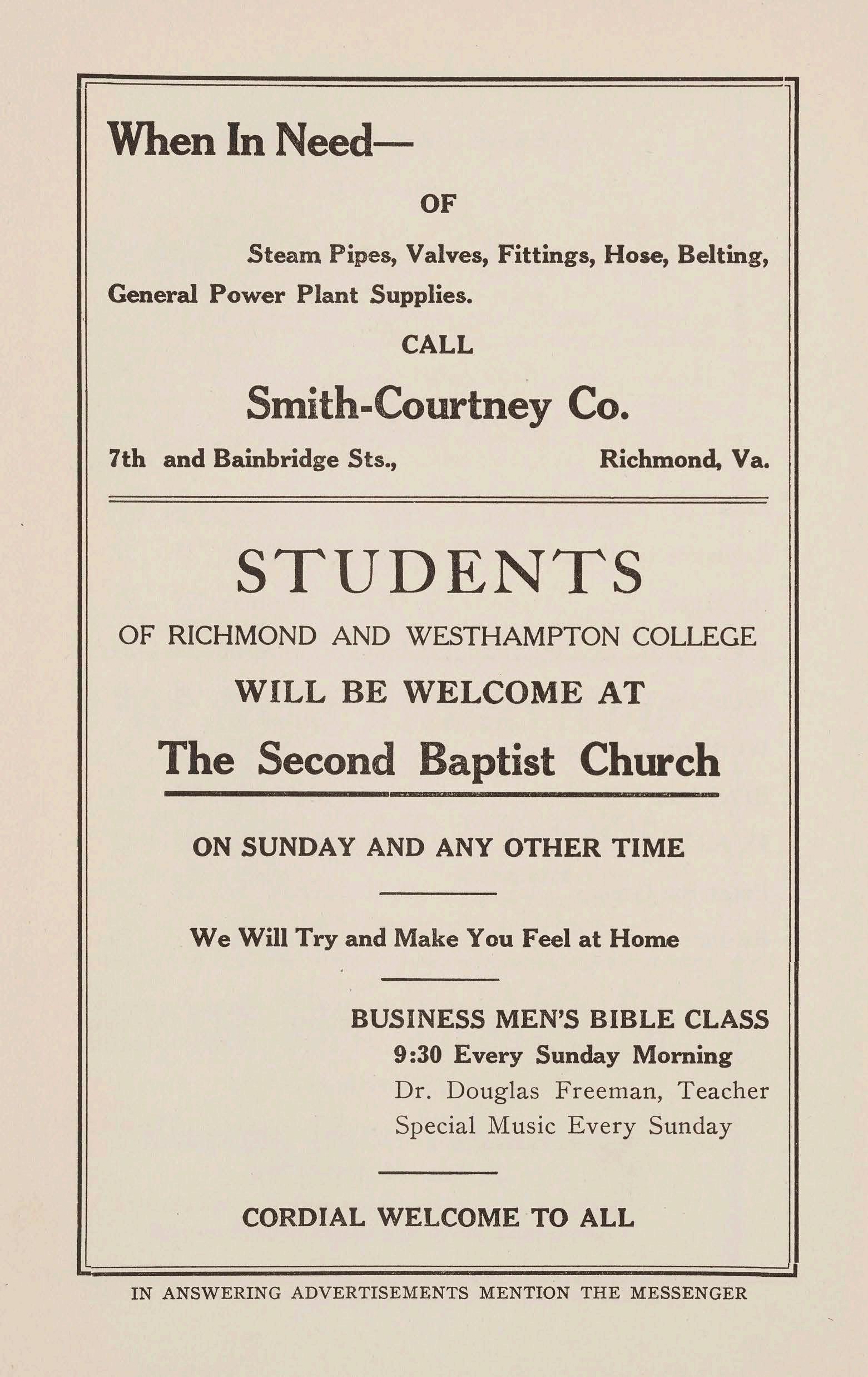



R. T. MARSH, JR., '22 ________________________________Editor-in-Chief
A. B. CLARKE, '2J ____________________________________ Assistant Editor
0. L. HITE, '22 ____________________________________Business Manager
G. S. MITCHELL ________________________Assistant Business Manager
C. W. NEWTON _____________________________________Exchange Editor
ASSOCIATE EDITORS Mu Sigma Rho
R. E. GARST
B. U. DAVENPORT
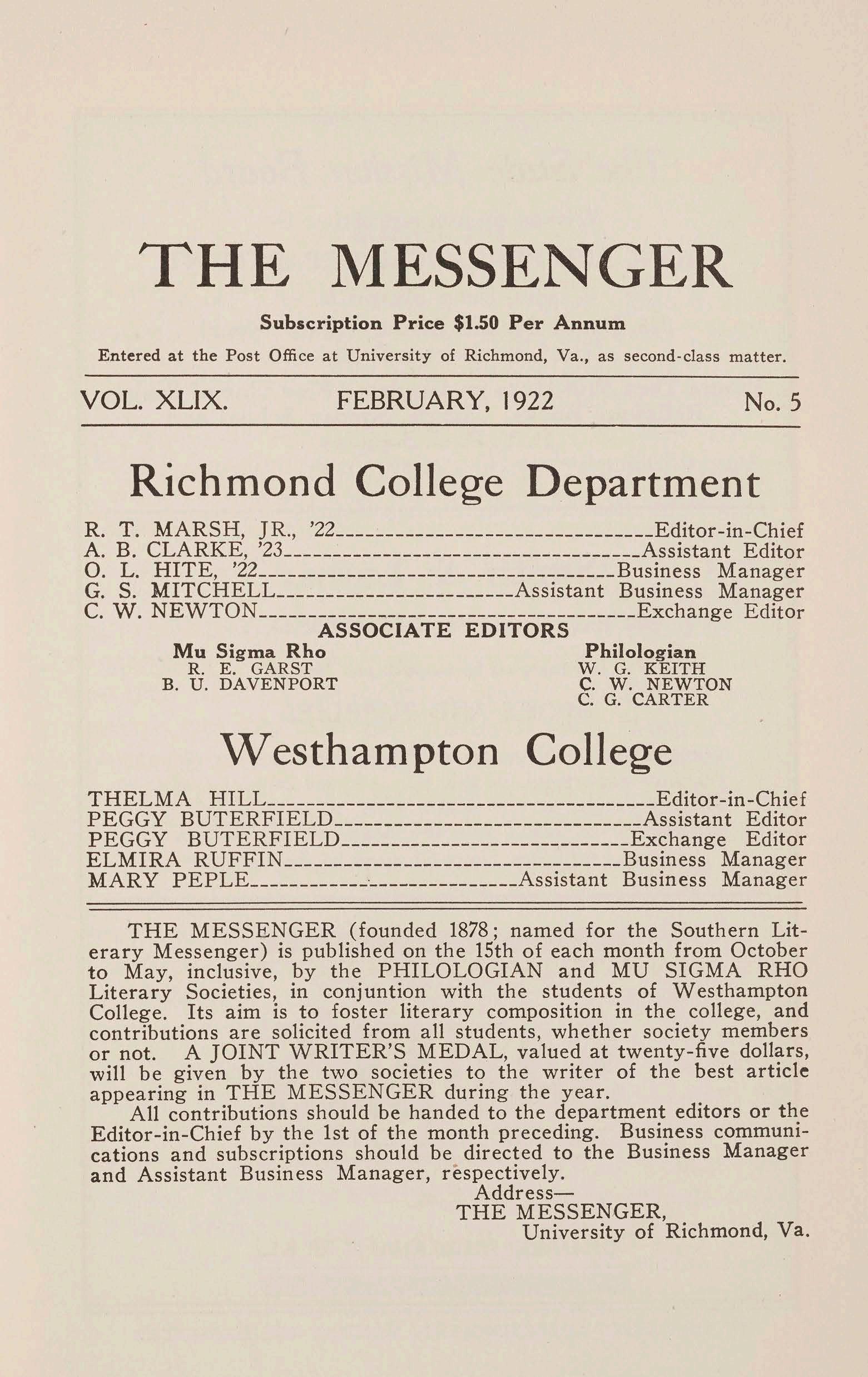
W. G. KEITH
C. W. NEWTON
C. G. CARTER
THELMA HILL_ ______________________________________Editor-in-Chief
PEGGY BUTERFIELD _______________________________ Assistant Editor
PEGGY BUTERFIELD _____________________________Exchange Editor
ELMIRA RUFFIN __________________________________Business Manager
MARY PEPLE ___________________________Assistant Business Manager
THE MESSENGER (founded 1878; named for the Southern Literary Messenger) is published on the 15th of each month from October to May, inclusive, by the PHILOLOGIAN and MU SIGMA RHO Literary Societies, in conjuntion with the students of Westhampton College. Its aim is to foster literary composition in the college, and contributions are solicited from all students, whether society members or not. A JOINT WRITER'S MEDAL, valued at twenty-five dollars, will be given by the two societies to the writer of the best article appearing in THE MESSENGER during the year. All contributions should be handed to the department editors or the Editor-in-Chief by the 1st of the month preceding. Business communications and subscriptions should be directed to the Business Manager and Assistant Business Manager, respectively.
Address-
THE MESSENGER, University of Richmond, Va.
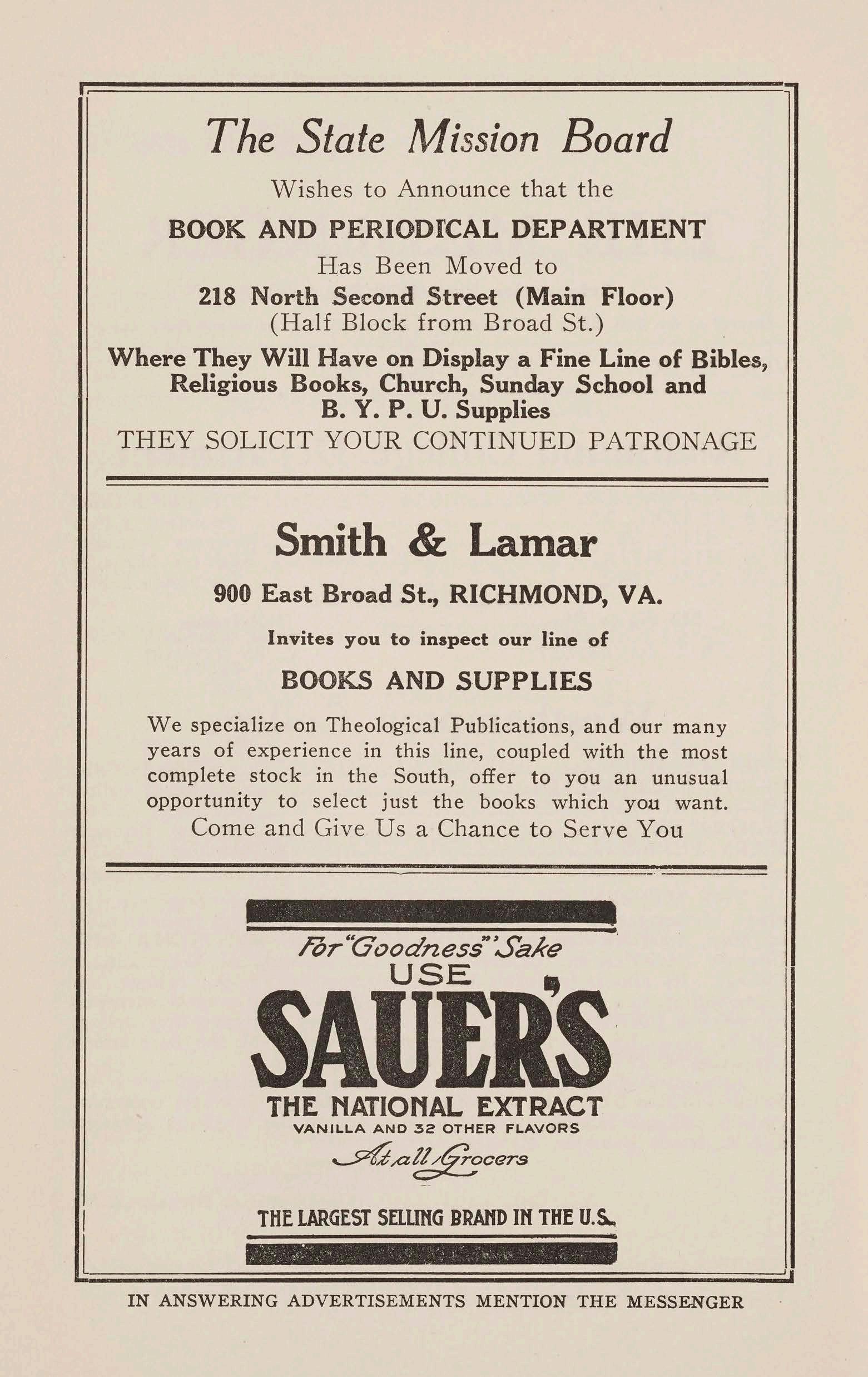
Wishes to Announce that the BOOK AND PERIODfCAL DEPARTMENT
Has Been Moved to 218 North Second Street (Main Floor) (Half Block from Broad St.)
Where They Will Have on Display a Fine Line of Bibles, Religious Books, Church, Sunday School and B. Y. P. U. Supplies THEY SOLICIT YOUR CONTINUED PATRONAGE
900 East Broad St., RICHMOND, VA.
Invites you to inspect our line of BOOKS AND SUPPLIES
We specialize on Theological Publications, and our many years of experience in this line, coupled with the most complete stock in the South, offer to you an unusual opportunity to select just the books which you want. Come and Give Us a Chance to Serve You
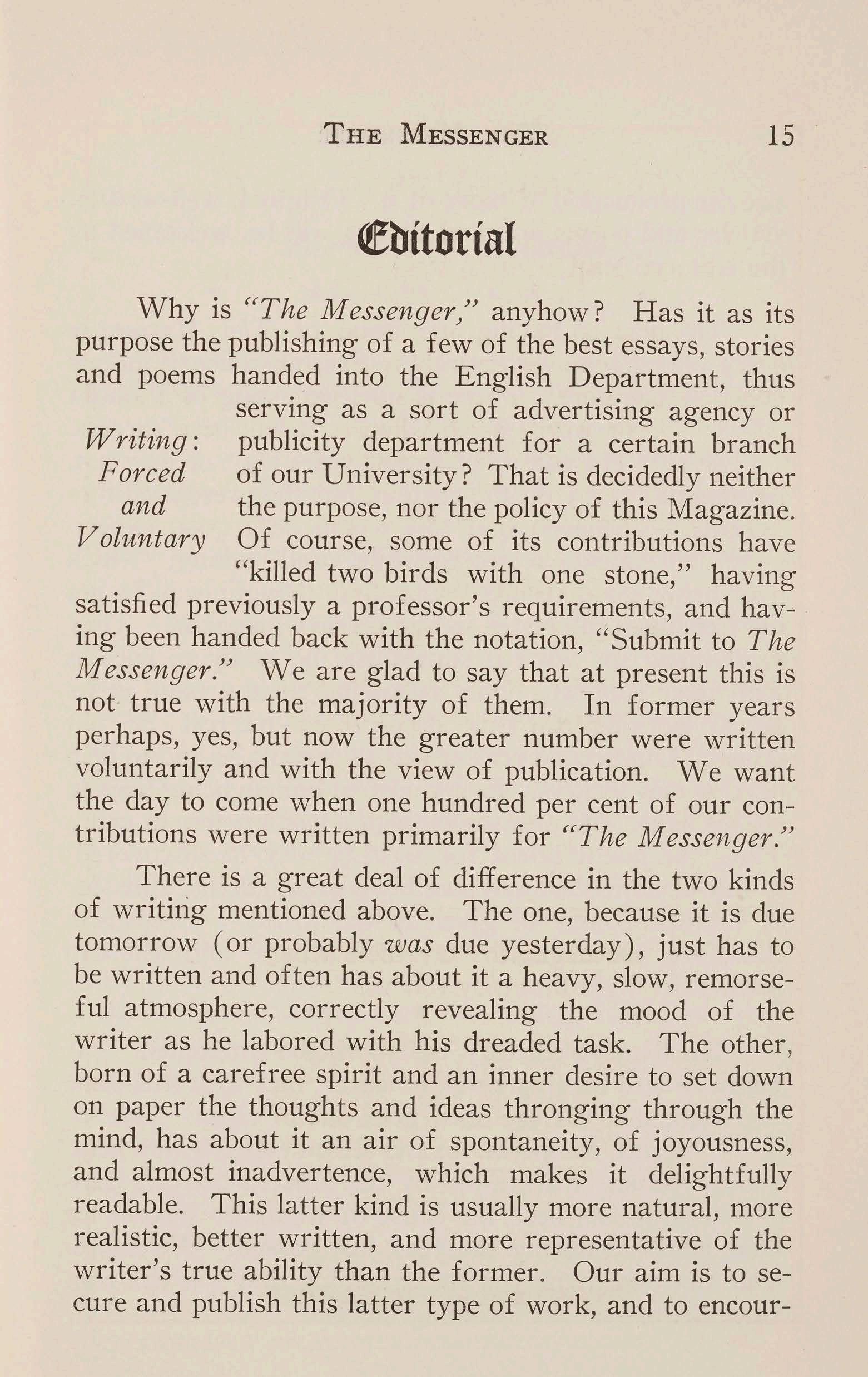
Why is "The Messenger," anyhow? Has it as its purpose the publishing of a few of the best essays, stories and poems handed into the English Department , thus serving as a sort of advertising agency or Writing: publicity department for a certain branch Forced of our University? That is decidedly neither and the purpose, nor the policy of this Magazine. Voluntary Of course, some of its contributions have "killed two birds with one stone," having satisfied previously a professor's requirements, and having been handed back with the notation, "Submit to The Messenger." We are glad to say that at present this is not true with the majority of them. In former years perhaps, yes, but now the greater number were written voluntarily and with the view of publication. We want the day to come when one hundred per cent of our contributions were written primarily for "The Messenger."
There is a great deal of difference in the two kinds of writirig mentioned above. The one, because it is due tomorrow ( or probably was due yesterday), just has to be written and often has about it a heavy, slow, remorseful atmosphere , correctly revealing the mood of the writer as he labored with his dreaded task. The other , born of a carefree spirit and an inner desire to set down on paper the thoughts and ideas thronging through the mind, has about it an air of spontaneity, of joyousness, and almost inadvertence, which makes it delightfully readable. This latter kind is usually more natural, more realistic, better written, and more representative of the writer's true ability than the former. Our aim is to secure and publish this latter type of work, and to encour-
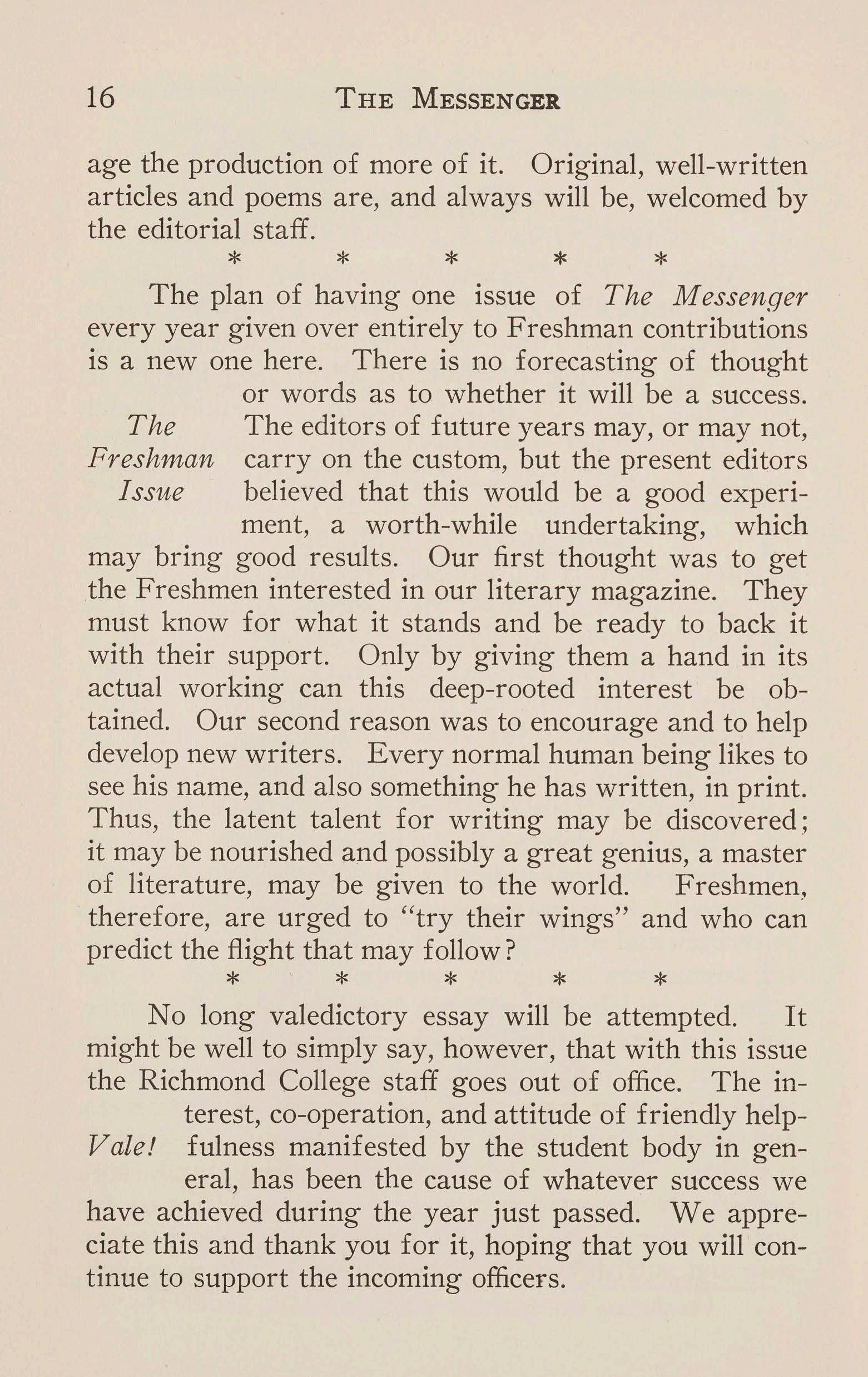
age the production of more of it. Original, well-written articles and poems are, and always will be, welcomed by the editorial staff.
The plan of having one issue of The Messenger every year given over entirely to Freshman contributions is a new one here. There is no forecasting of thought or words as to whether it will be a success. The The editors of future years may, or may not, Freshman carry on the custom, but the present editors Issue believed that this would be a good experiment, a worth-while undertaking, which may bring good results. Our first thought was to get the Freshmen interested in our literary magazine. They must know for what it stands and be ready to back it with their support. Only by giving them a hand in its actual working can this deep-rooted interest be obtained . Our second reason was to encourage and to help develop new writers. Every normal human being likes to see his name, and also something he has written, in print. Thus, the latent talent for writing may be discovered; it may be nourished and possibly a great genius, a master of literature, may be given to the world. Freshmen, therefore, are urged to "try their wings" and who can predict the flight that may follow?
No long valedictory essay will be attempted. It might be well to simply say, however, that with this issue the Richmond College staff goes out of office. The interest, co-operation, and attitude of friendly helpV ale! fulness manifested by the student body in general, has been the cause of whatever success we have achieved during the year just passed. We appreciate this and thank you for it, hoping that you will continue to support the incoming officers.
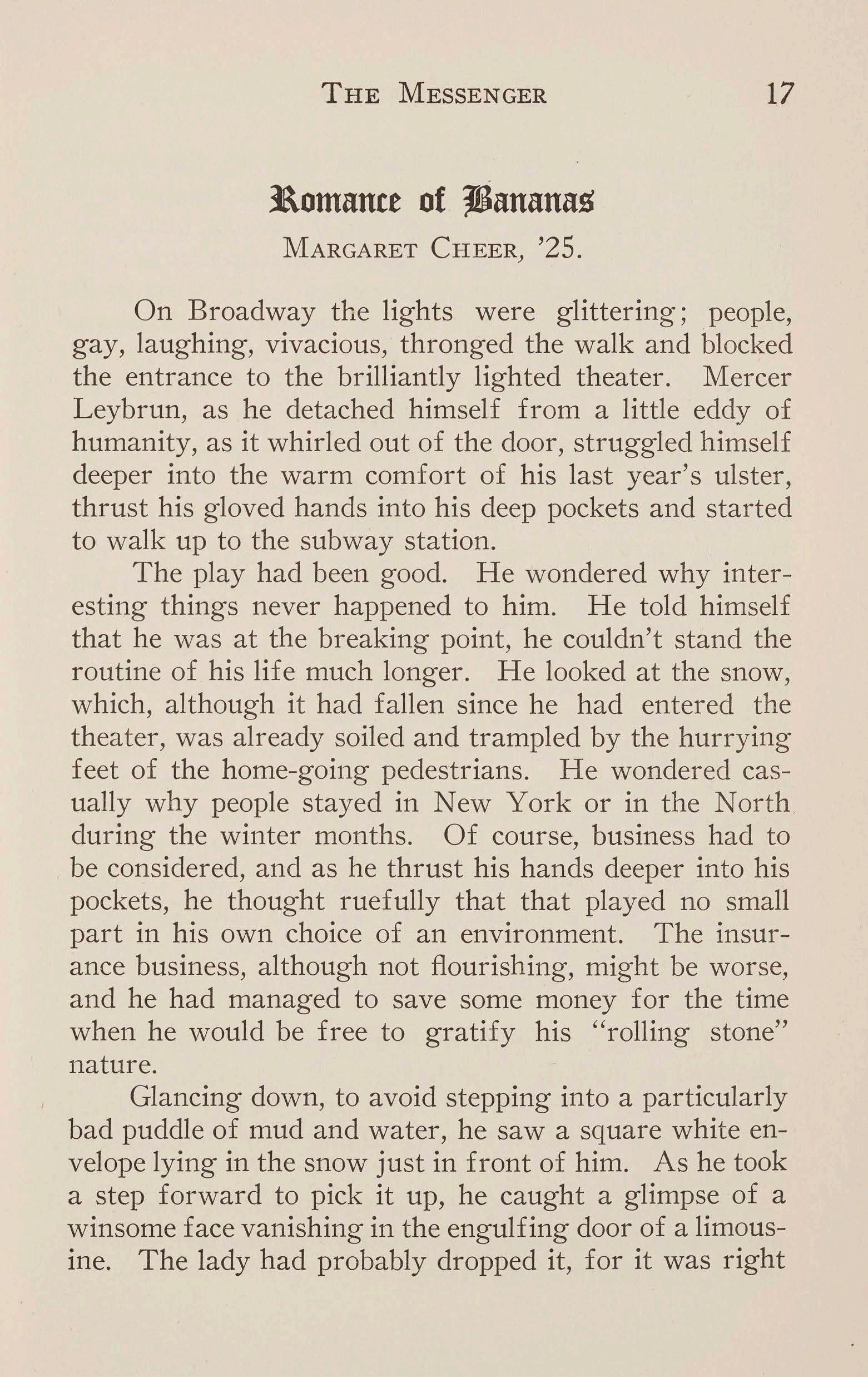
MARGARET CHEER, '25.
On Broadway the lights were glittering; people, gay, laughing, vivacious, thronged the walk and blocked the entrance to the brilliantly lighted theater. Mercer Leybrun, as he detached himself from a little eddy of humanity, as it whirled out of the door, struggled himself deeper into the warm comfort of his last year's ulster, thrust his gloved hands into his deep pockets and started to walk up to the subway station.
The play had been good. He wondered why interesting things never happened to him. He told himself that he was at the breaking point, he couldn't stand the routine of his life much longer. He looked at the snow, which, although it had fallen since he had entered the theater, was already soiled and trampled by the hurrying feet of the home-going pedestrians. He wondered casually why people stayed in New York or in the North during the winter months. Of course, business had to be considered, and as he thrust his hands deeper into his pockets, he thought ruefully that that played no small part in his own choice of an environment. The insurance business, although not flourishing, might be worse, and he had managed to save some money for the time when he would be free to gratify his "rolling stone" nature.
Glancing down, to avoid stepping into a particularly bad puddle of mud and water, he saw a square white envelope lying in the snow just in front of him. As he took a step forward to pick it up, he caught a glimpse of a winsome face vanishing in the engulfing door of a limousine. The lady had probably dropped it, for it was right

in her path. As he started after the car, the crowd pushed him to and fro impatiently. Mercer stopped and picked up the envelope. Forgetful of the people, he turned it in his hands, examining it; then, realizing that he and his find were attracting unwelcome attention, he put it in his pocket and, walking to the curb, summoned a hansom. In some intangible way, that square envelope of heavy white paper sp elled romance to him. Was it possible that it had been dropped purposely? He recalled that the girl had smiled at him and it now seemed in retrospect that she had gestured to the envelope as she stepped in the car. As soon as he was fairly on his way, he drew it from his pocket, and moving to the end of the seat nearest the lamp, he once more inspected it . He noticed the strange foreign stamp, and attempted to decipher the p ostmark and address; but alas , it had remained too long in the snow and when he had put it in his pocket the ink had become blurred and unintelligible.
Opening the envelope he drew a single sheet of paper from it. At the top, a little to the right was an entrancing little water color sketch, with barely distinguishable palm trees bending over a tiny thatched cottage. The whole was entirely surrounded by the bluest of blue waters. Below the little sketch was the name N- and the initials K. B. were inscribed in the corner. The writing ( it was really printing), was charming; feminine and yet spirited.
To Mercer's disappointment, the sheet was not the first page of the letter, but the last one. The name Kinnis Boyer graced the last line. It was seemingly a portion of a description of a delectable island, near the mainland of South America.
Holding the letter , he called directions to the cabby and before he realized it, was before the austere looking house, in which he kept rooms.
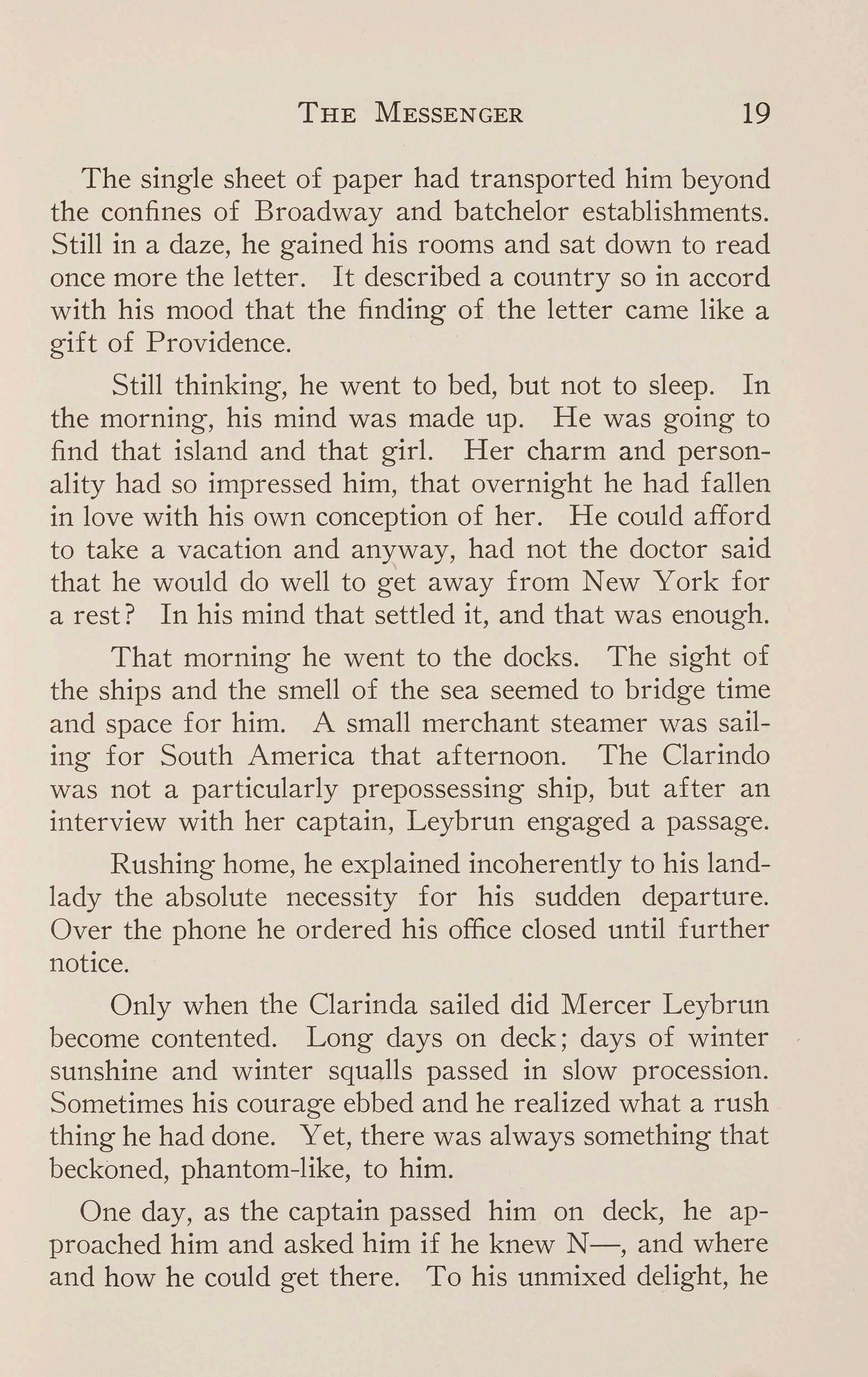
The single sheet of paper had transported him beyond the confines of Broadway and batchelor establishments. Still in a daze, he gained his rooms and sat down to read once more the letter. It described a country so in accord with his mood that the finding of the letter came like a gift of Providence.
Still thinking, he went to bed, but not to sleep. In the morning, his mind was made up. He was going to find that island and that girl. Her charm and personality had so impressed him, that overnight he had fallen in love with his own conception of her. He could afford to take a vacation and anyway, had not the doctor said that he would do well to get away from New York for a rest? In his mind that settled it, and that was enough.
That morning he went to the docks. The sight of the ships and the smell of the sea seemed to bridge time and space for him. A small merchant steamer was sailing for South America that afternoon. The Clarindo was not a particularly prepossessing ship, but after an interview with her captain, Leybrun engaged a passage.
Rushing home, he explained incoherently to his landlady the absolute necessity for his sudden departure. Over the phone he ordered his office closed until further notice.
Only when the Clarinda sailed did Mercer Leybrun become contented. Long days on deck; days of winter sunshine and winter squalls passed in slow procession. Sometimes his courage ebbed and he realized what a rush thing he had done. Yet, there was always something that beckoned, phantom-like, to him.
One day, as the captain passed him on deck, he approached him and asked him if he knew N-, and where and how he could get there. To his unmixed delight, he
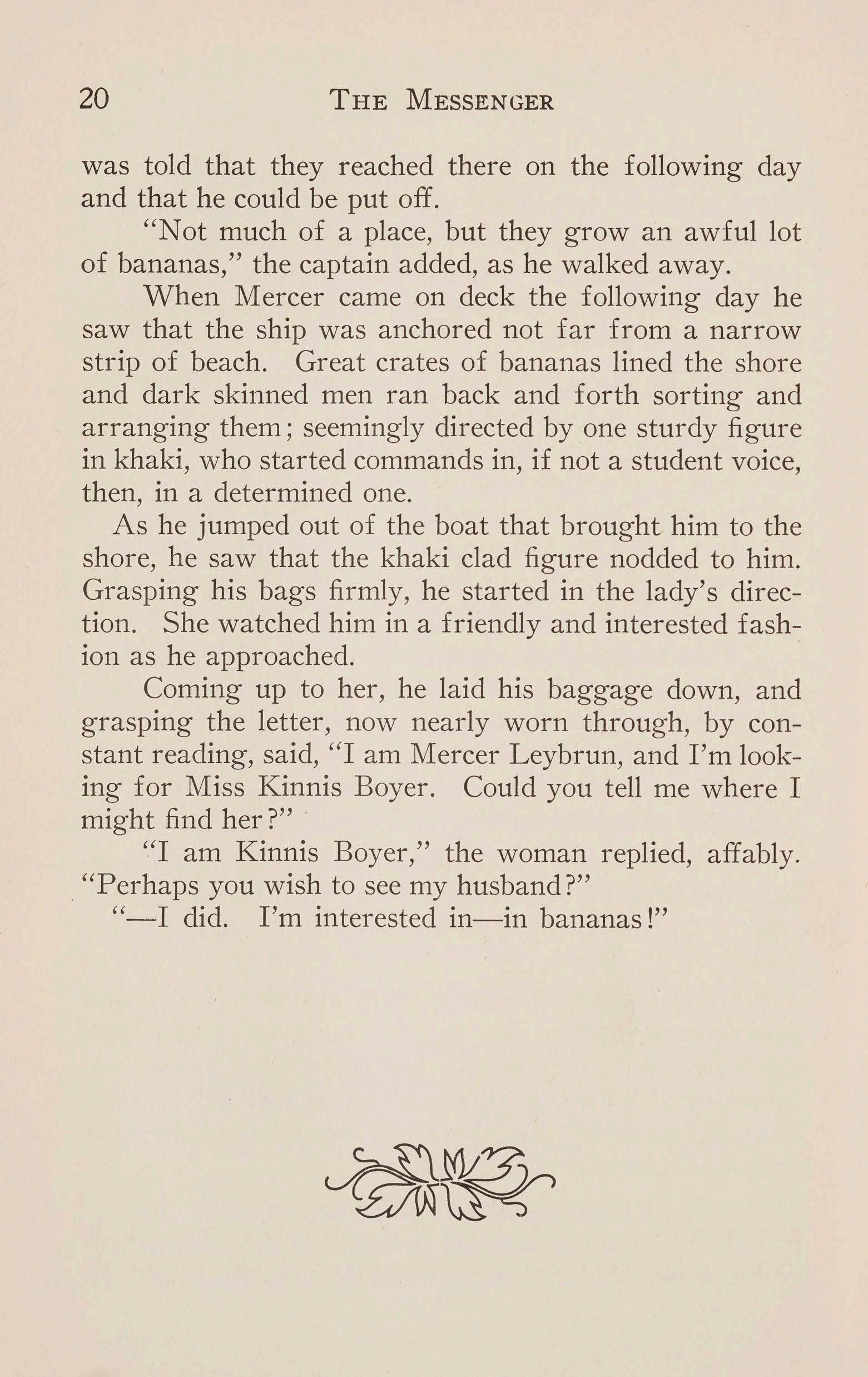
was told that they reached there on the following day and that he could be put off.
"Not much of a place , but they grow an awful lot of bananas," the captain added, as he walked away. When Mercer came on deck the following day he saw that the ship was anchored not far from a narrow strip of beach. Great crates of bananas lined the shore and dark skinned men ran back and forth sorting and arranging them; seemingly directed by one sturdy figure in khaki, who started commands in, if not a student voice, then, in a determined one.
As he jumped out of the boat that brought him to the shore, he saw that the khaki clad figure nodded to him. Grasping his bags firmly, he started in the lady's direction. She watched him in a friendly and interested fashion as he approached.
Coming up to her, he laid his baggage down, and grasping the letter, now nearly worn through , by constant reading, said, "I am Mercer Leybrun , and I'm looking for Miss Kinnis Boyer. Could you tell me where I might find her?"
"I am Kinnis Boyer," the woman replied, affably . . "Perhaps you wish to see my husband?" "-I did. I'm interested in-in bananas!"
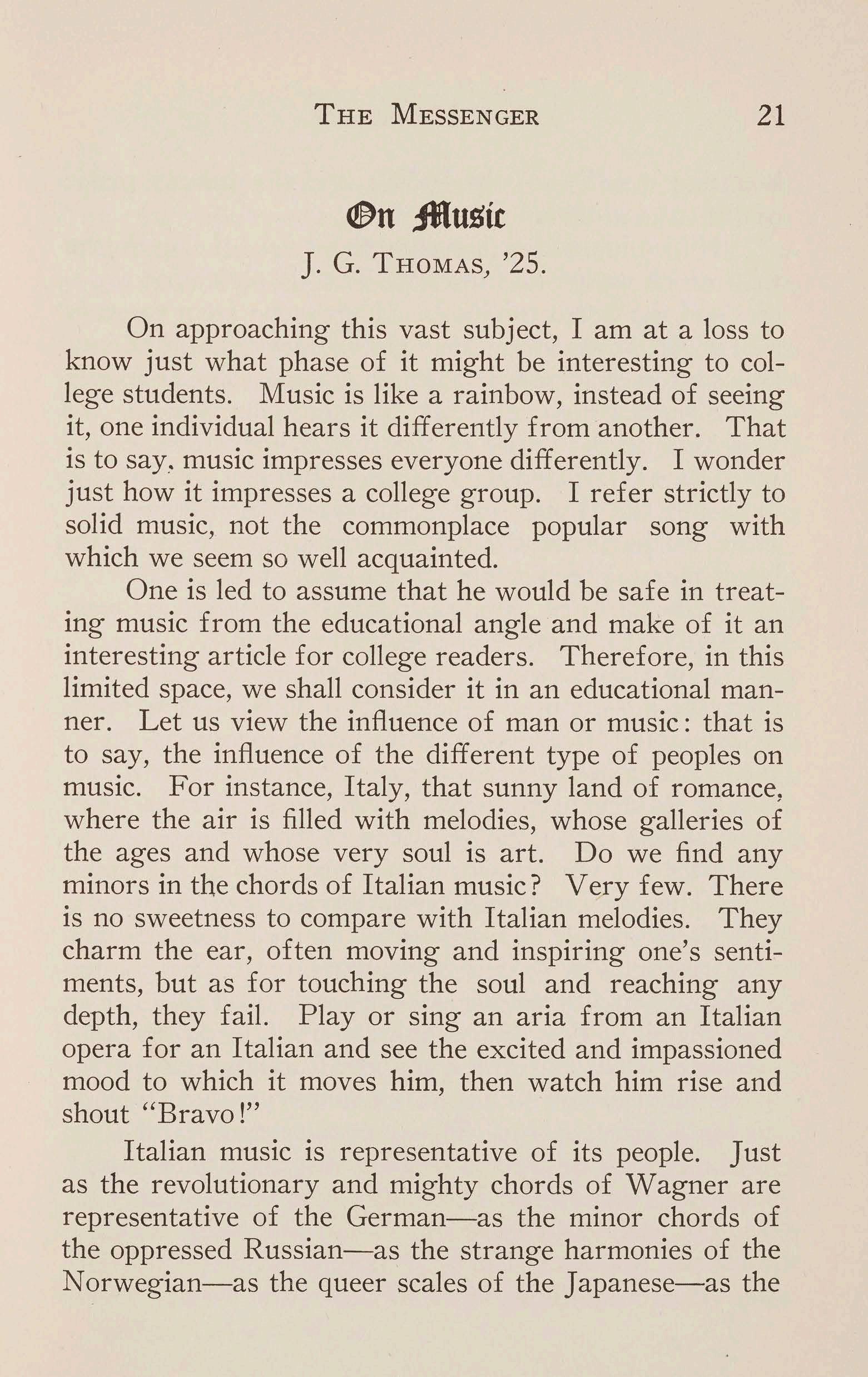
J. G. THOMAS, '25.
On approaching this vast subject, I am at a loss to know just what phase of it might be interesting to college students. Music is like a rainbow, instead of seeing it, one individual hears it differently from another. That is to say. music impresses everyone differently. I wonder just how it impresses a college group. I refer strictly to solid music, not the commonplace popular song with which we seem so well acquainted.
One is led to assume that he would be safe in treating music from the educational angle and make of it an interesting article for college readers. Therefore, in this limited space, we shall consider it in an educational manner. Let us view the influence of man or music: that is to say, the influence of the different type of peoples on music. For instance, Italy, that sunny land of romance, where the air is filled with melodies, whose galleries of the ages and whose very soul is art. Do we find any minors in the chords of Italian music? Very few. There is no sweetness to compare with Italian melodies. They charm the ear, often moving and inspiring one's sentiments, but as for touching the soul and reaching any depth, they fail. Play or sing an aria from an Italian opera for an Italian and see the excited and impassioned mood to which it moves him, then watch him rise and shout "Bravo!"
Italian music is representative of its people. Just as the revolutionary and mighty chords of Wagner are representative of the German-as the minor chords of the oppressed Russian-as the strange harmonies of the Norwegian-as the queer scales of the Japanese-as the
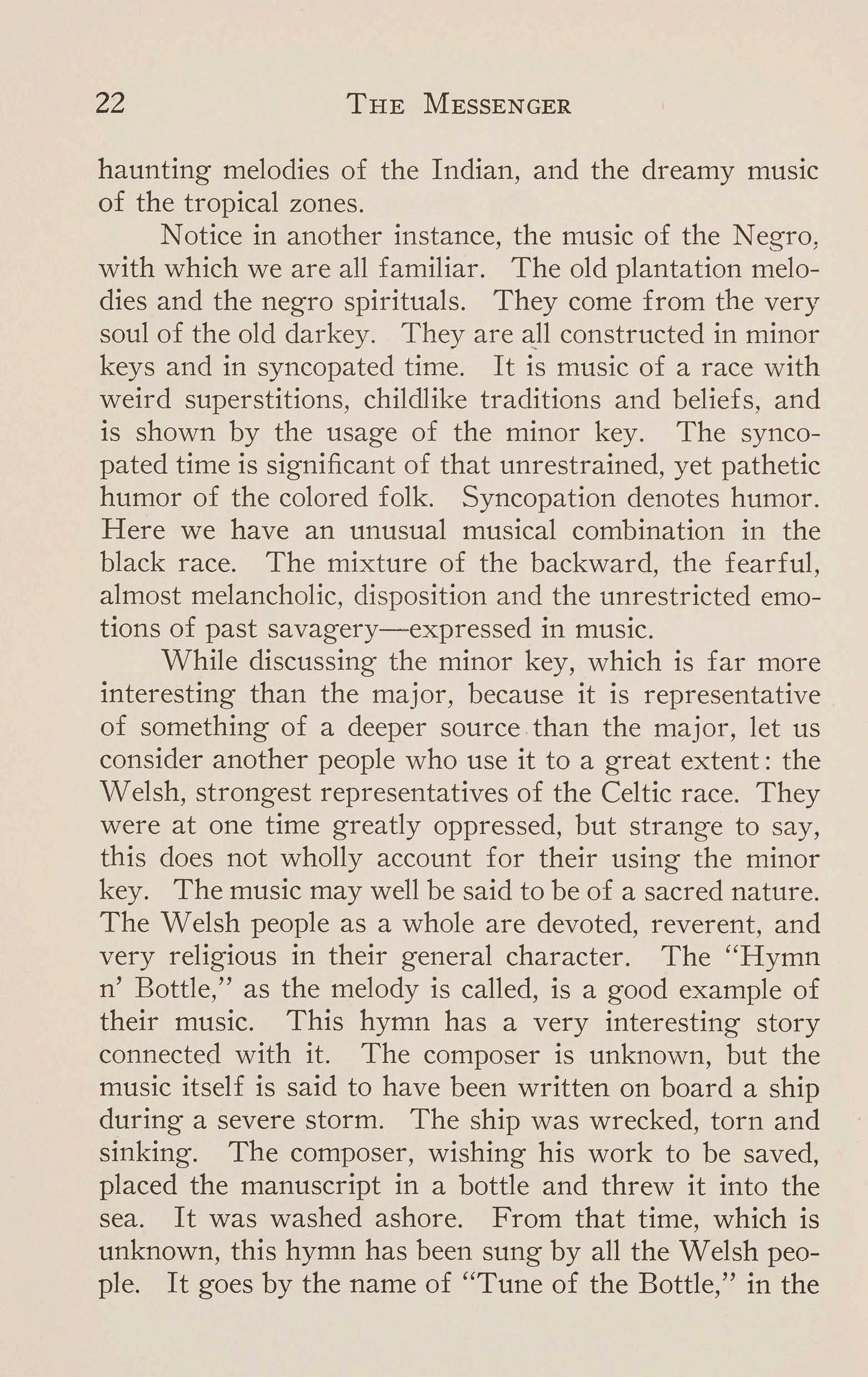
haunting melodies of the Indian, and the dreamy music of the tropical zones.
Notice in another instance, the music of the N egro 1 with which we are all familiar. The old plantation melodies and the negro spirituals. They come from the very soul of the old darkey. They are a)l constructed in minor keys and in syncopated time. It is music of a race with weird superstitions , childlike traditions and beliefs , and is shown by the usage of the minor key. The syncopated time is significant of that unrestrained, yet pathetic humor of the colored folk. Syncopation denotes humor. Here we have an unusual musical combination in the black race. The mixture of the backward, the fearful, almost melancholic, disposition and the unrestricted emotions of past savagery-expressed in music.
While discussing the minor key, which is far more interesting than the major, because it is representative of something of a deeper source than the major, let us consider another people who use it to a great extent: the \i\Telsh, strongest representatives of the Celtic race. They were at one time greatly oppressed, but strange to say, this does not wholly account for their using the minor key. The music may well be said to be of a sacred nature. The Welsh people as a whole are devoted, reverent, and very religious in their general character. The "Hymn n' Bottle," as the melody is called, is a good example of their music. This hymn has a very interesting story connected with it. The composer is unknown, but the music itself is said to have been written on board a ship during a severe storm. The ship was wrecked, torn and sinking. The composer, wishing his work to be saved, placed the manuscript in a bottle and threw it into the sea. It was washed ashore. From that time, which is unknown, this hymn has been sung by all the Welsh people. It goes by the name of "Tune of the Bottle," in the

English translation. The song is of heaven and the glories which come to one whose earthly tasks are over. It is sacred to every Welshman, and is sung in that language over the grave of one as his body returns to the earth.
There is also another reason, perhaps, of more importance than the one mentioned, for the use of the minor key among the Welsh. It is a queer characteristic . When the Welshman's cup of joy is empty and there is sadness in his heart, he expresses it in the minor key; when it overflows, he also expresses it in the minor; then when it is about half full, he turns to the major!
To know the full character of a people, the real nature and soul of a race or nation, one must know their music . Would we not have a better understanding between the nations if our statesmen and people were better versed in music? Art is the only medium of expression of the highest ideals of a people. Music is the one great element of art and the greatest outlet of the inner emotions of man. Would we not be in a better condition today had the language of music been heeded or even heard? Would Russia be in her present state had the tones of the oppressed been heeded, or would Germany have overflowed her banks had her mighty chords been given the proper hearing and interpretation? It is a fact that the world is in a critical state today. It has been ruled from a material standpoint. Art is to a large degree lacking, for nations have turned their eyes from aestheticism to material things. Consider our present condition and examine the cause. The real cause of it all may be summed up in a line: the ideals and longings of the peoples of the earth have failed to be expressed by materialism, and art has been given a deaf ear. The world is making an attempt at reconstruction. Now is the time to give music its appointed place from which it has been forced to decline.
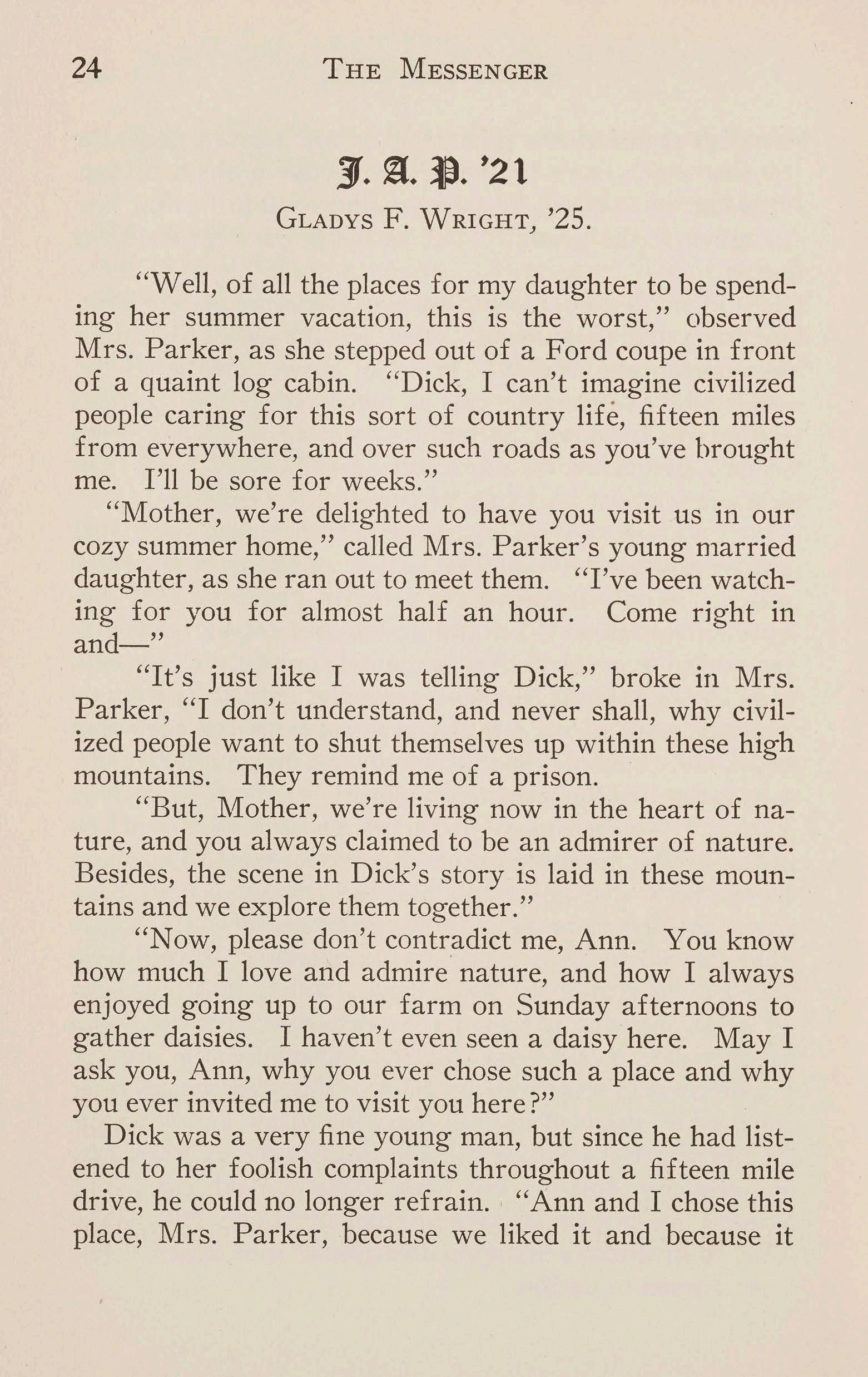
GLADYS F. WRIGHT, '25.
"Well, of all the places for my daughter to be spending her summer vacation, this is the worst," observed Mrs. Parker, as she stepped out of a Ford coupe in front of a quaint log cabin. "Dick, I can't imagine civilized people caring for this sort of country life, fifteen miles from everywhere, and over such roads as you've brought me. I'll be sore for weeks."
"Mother, we're delighted to have you visit us in our cozy summer home," called Mrs. Parker's young married daughter, as she ran out to meet them. "I've been watching for you for almost half an hour. Come right in and-"
"It's just like I was telling Dick," broke in Mrs. Parker, "I don't understand, and never shall, why civilized people want to shut themselves up within these high mountains. They remind me of a prison.
"But, 1\tiother, we're living now in the heart of nature, and you always claimed to be an admirer of nature. Besides, the scene in Dick's story is laid in these mountains and we explore them together."
"Now, please don't contradict me, Ann. You know how much I love and admire nature, and how I always enjoyed going up to our farm on Sunday afternoons to gather daisies. I haven't even seen a daisy here. May I ask you, Ann, why you ever chose such a place and why you ever invited me to visit you here?"
Dick was a very fine young man, but since he had listened to her foolish complaints throughout a fifteen mile drive, he could no longer refrain. "Ann and I chose this place, Mrs. Parker, because we liked it and because it
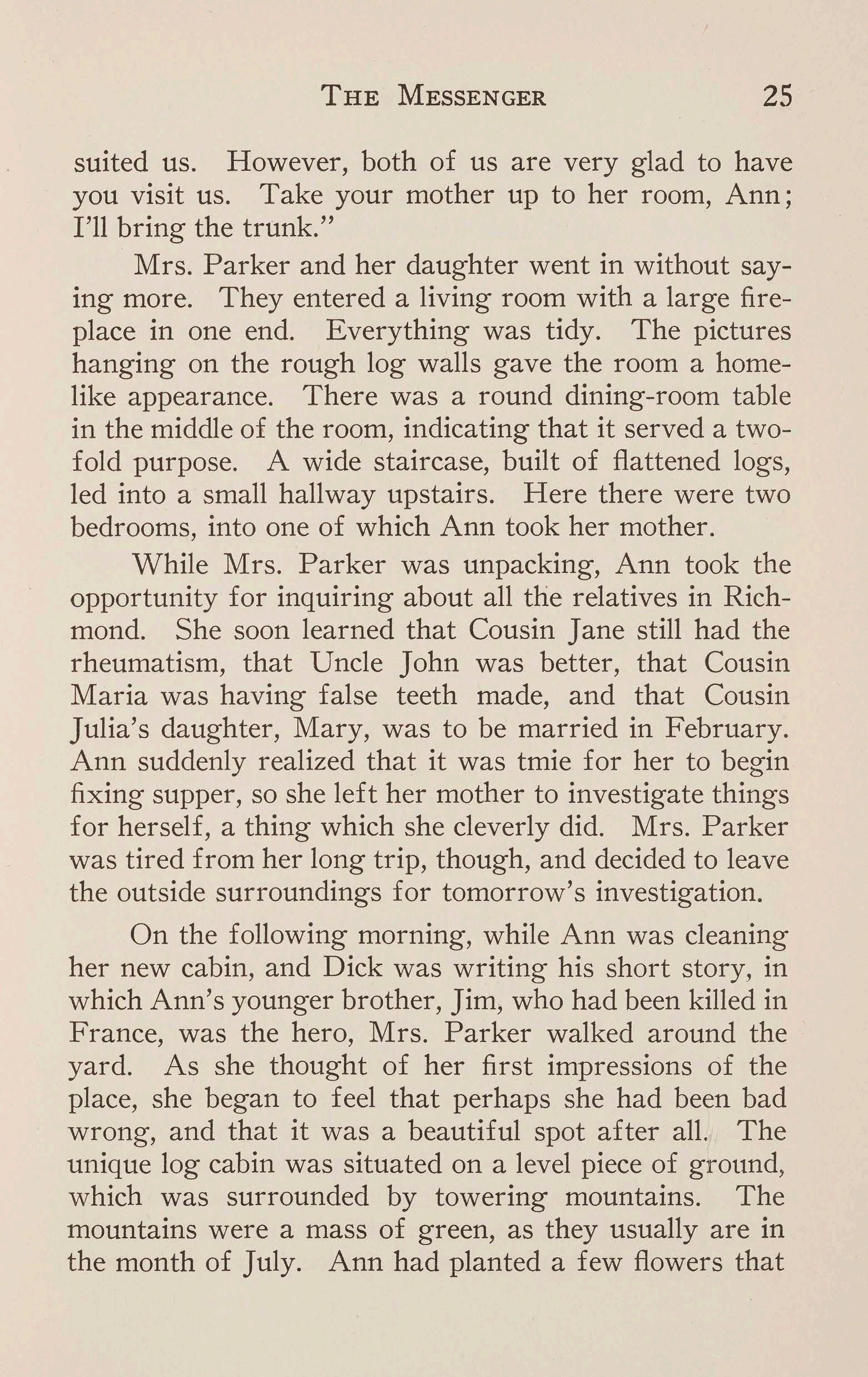
suited us. However, both of us are very glad to have you visit us. Take your mother up to her room, Ann; I'll bring the trunk."
Mrs. Parker and her daughter went in without saying more. They entered a living room with a large fireplace in one end. Everything was tidy. The pictures hanging on the rough log walls gave the room a homelike appearance. There was a round dining-room table in the middle of the room, indicating that it served a twofold purpose. A wide staircase, built of flattened logs, led into a small hallway upstairs. Here there were two bedrooms, into one of which Ann took her mother.
While Mrs. Parker was unpacking, Ann took the opportunity for inquiring about all the relatives in Richmond. She soon learned that Cousin Jane still had the rheumatism, that Uncle John was better, that Cousin Maria was having false teeth made, and that Cousin Julia's daughter, Mary, was to be married in February. Ann suddenly realized that it was tmie for her to begin fixing supper, so she left her mother to investigate things for herself, a thing which she cleverly did. Mrs. Parker was tired from her long trip, though, and decided to leave the outside surroundings for tomorrow's investigation.
On the following morning, while Ann was cleaning her new cabin, and Dick was writing his short story, in which Ann's younger brother, Jim, who had been killed in France, was the hero, Mrs. Parker walked around the yard. As she thought of her first impressions of the place, she began to feel that perhaps she had been bad wrong, and that it was a beautiful spot after all. The unique log cabin was situated on a level piece of ground, which was surrounded by towering mountains. The mountains were a mass of green, as they usually are in the month of July. Ann had planted a few flowers that
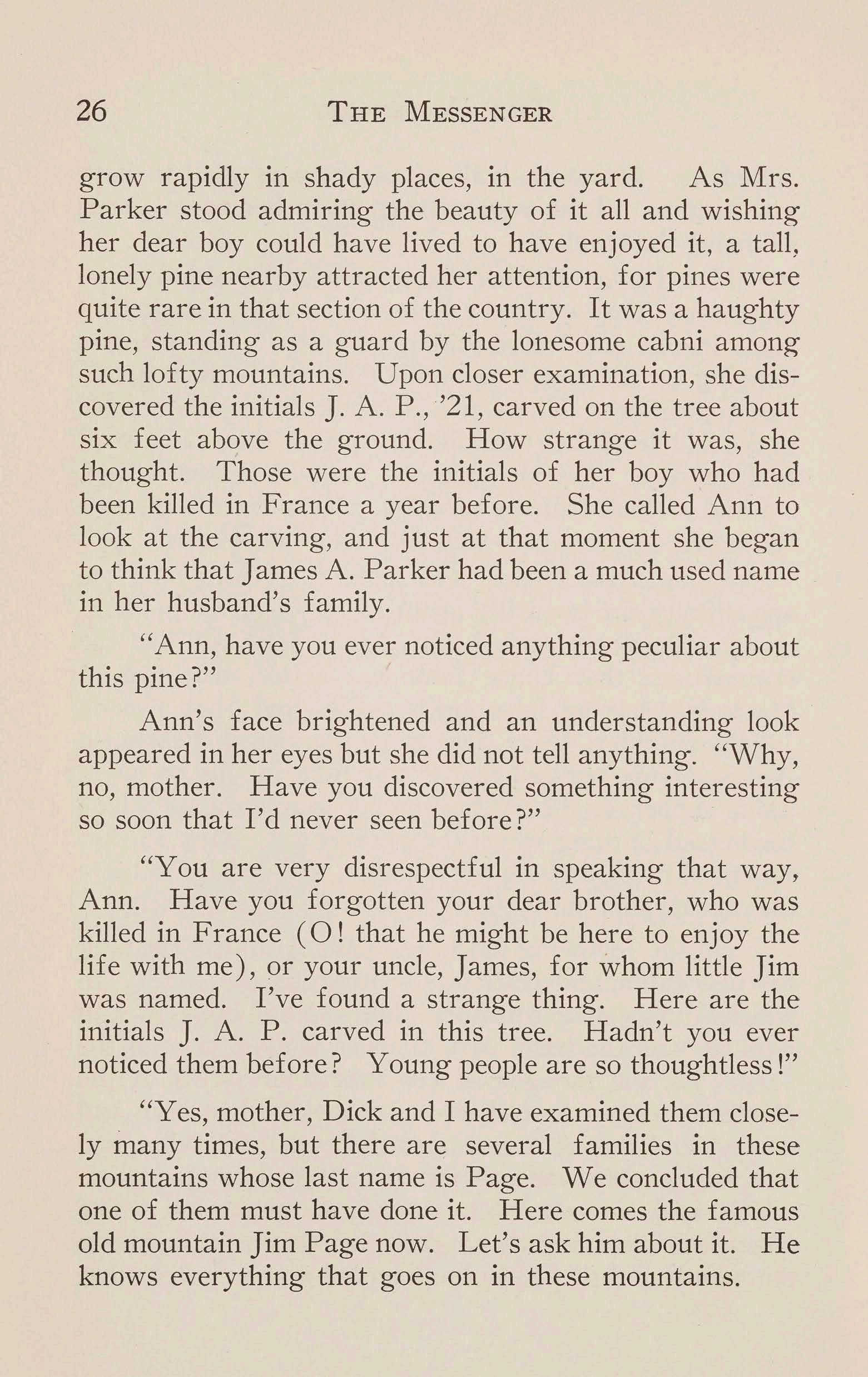
grow rapidly in shady places, in the yard. As Mrs. Parker stood admiring the beauty of it all and wishing her dear boy could have lived to have enjoyed it, a tall, lonely pine nearby attracted her attention, for pines were quite rare in that section of the country. It was a haughty pine, standing as a guard by the lonesome cabni among such lofty mountains. Upon closer examination, she discovered the initials J. A. P., '21, carved on the tree about six feet above the ground. How strange it was, she thought. Those were the initials of her boy who had been killed in France a year before. She called Ann to look at the carving, and just at that moment she began to think that James A. Parker had been a much used name in her husband's family.
"Ann, have you ever noticed anything peculiar about this pine?"
Ann's face brightened and an understanding look appeared in her eyes but she did not tell anything. "Why, no, mother. Have you discovered something interesting so soon that I'd never seen before?"
"You are very disrespectful in speaking that way, Ann. Have you forgotten your dear brother, who was killed in France ( 0 ! that he might be here to enjoy the life with me), or your uncle, James, for whom little Jim was named. I've found a strange thing. Here are the initials J. A. P. carved in this tree. Hadn't you ever noticed them before? Young people are so thoughtless!"
"Yes, mother, Dick and I have examined them closely many times, but there are several families in these mountains whose last name is Page. We concluded that one of them must have done it. Here comes the famous old mountain Jim Page now. Let's ask him about it. He knows everything that goes on in these mountains.
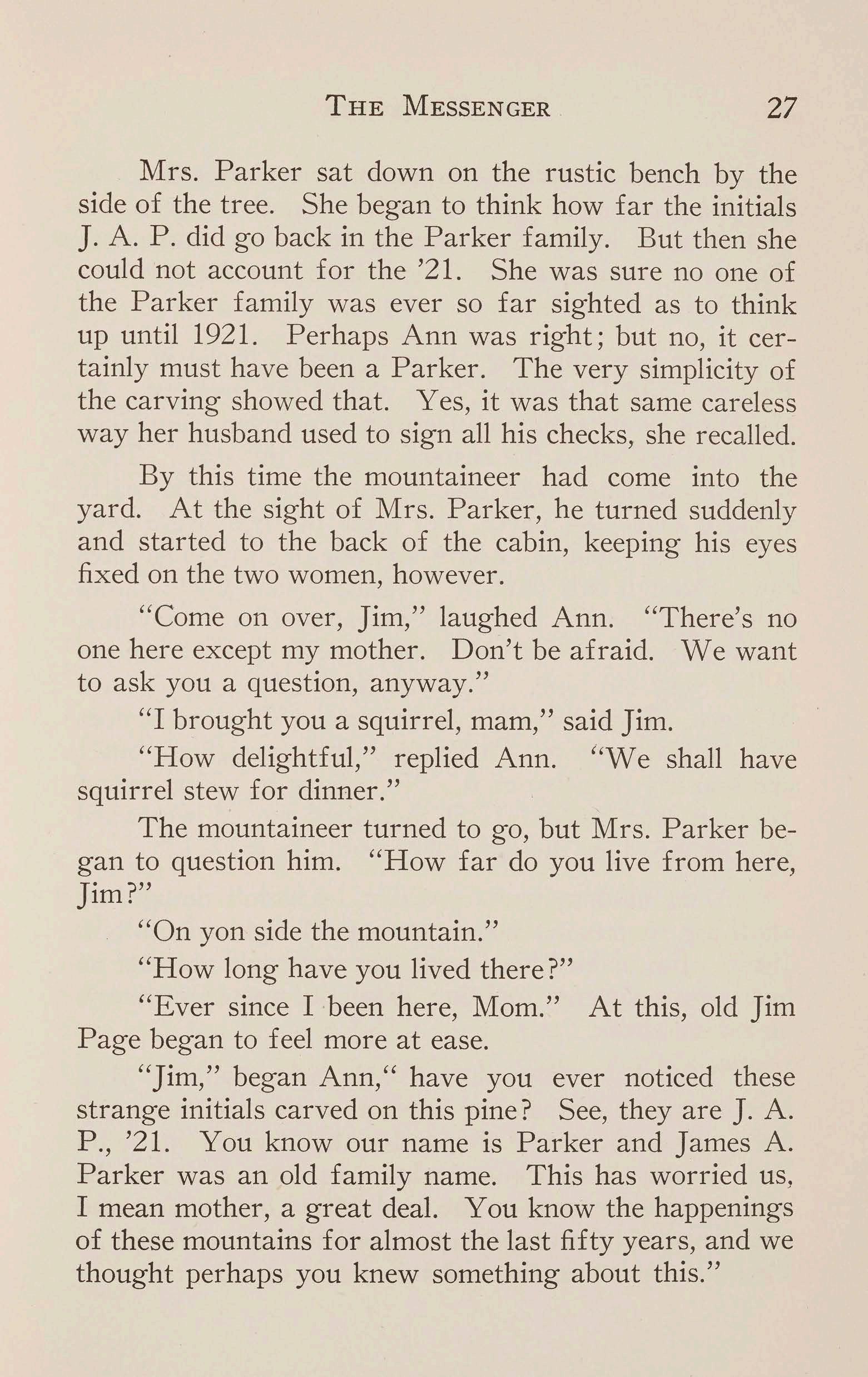
Mrs. Parker sat down on the rustic bench by the side of the tree. She began to think how far the initials J. A. P. did go back in the Parker family. But then she could not account for the '21. She was sure no one of the Parker family was ever so far sighted as to think up until 1921. Perhaps Ann was right; but no, it certainly must have been a Parker. The very simplicity of the carving showed that. Yes, it was that same careless way her husband used to sign all his checks, she recalled.
By this time the mountaineer had come into the yard. At the sight of Mrs. Parker, he turned suddenly and started to the back of the cabin, keeping his eyes fixed on the two women, however.
"Come on over, Jim," laughed Ann. "There's no one here except my mother. Don't be afraid. We want to ask you a question, anyway."
"I brought you a squirrel, mam," said Jim.
"How delightful," replied Ann. ''We shall have squirrel stew for dinner."
The mountaineer turned to go, but Mrs. Parker began to question him. "How far do you live from here, Jim?"
"On yon side the mountain."
"How long have you lived there?"
"Ever since I been here, Mom." At this, old Jim Page began to feel more at ease.
"Jim," began Ann," have you ever noticed these strange initials carved on this pine? See, they are J. A. P., '21. You know our name is Parker and James A. Parker was an old family name. This has worried us, I mean mother, a great deal. You know the happenings of these mountains for almost the last fifty years, and we thought perhaps you knew something about this."

Ann paused, but, as the mountaineer offered no reply, she continued: "I told mother that there were several families in these mountains whose last name was Page, and probably some of them did it, but she isn't convinced yet."
"I've been thinking about it, Ann," broke in Mrs. Parker," and I believe I have solved the mystery. As you know, your father's ancestors came over from England and settled in the eastern part of the state. They were not satisfied with this, so they followed that early western exploring party, and some of them were even killed by the Indians. I dare say, one of them must have came through this part of Virginia (your uncle James had records where they settled around Charlottesville), and must have carved his initials on this tree. I can tell it is a very old pine, with what little knowledge I have of pines. That doesn't account for the '21 though, does it? Maybe some old Parker was that farsighted, but I can scarcely conceive of it. No, I have it. That meant 1721; it was around 1700 that they moved westward and perhaps they thought there would be a 1721."
"Yes, mother, that's possible. I hadn't thought of anything so remote, but it sounds all right, doesn't it, Jim?" Jim nodded his assent, but one could see that he had quite a different opinion about the matter, although he did not speak.
"I remember now, since I've thought about it," Mrs. Parker went on, "that I've heard your uncle James speak quite often about the discoveries the Parkers made on their western exploring parties. In fact, I believe he made several lectures on the exploration of the west and mentioned his great, great grandfather's name, James A. Parker I, in connection with it.
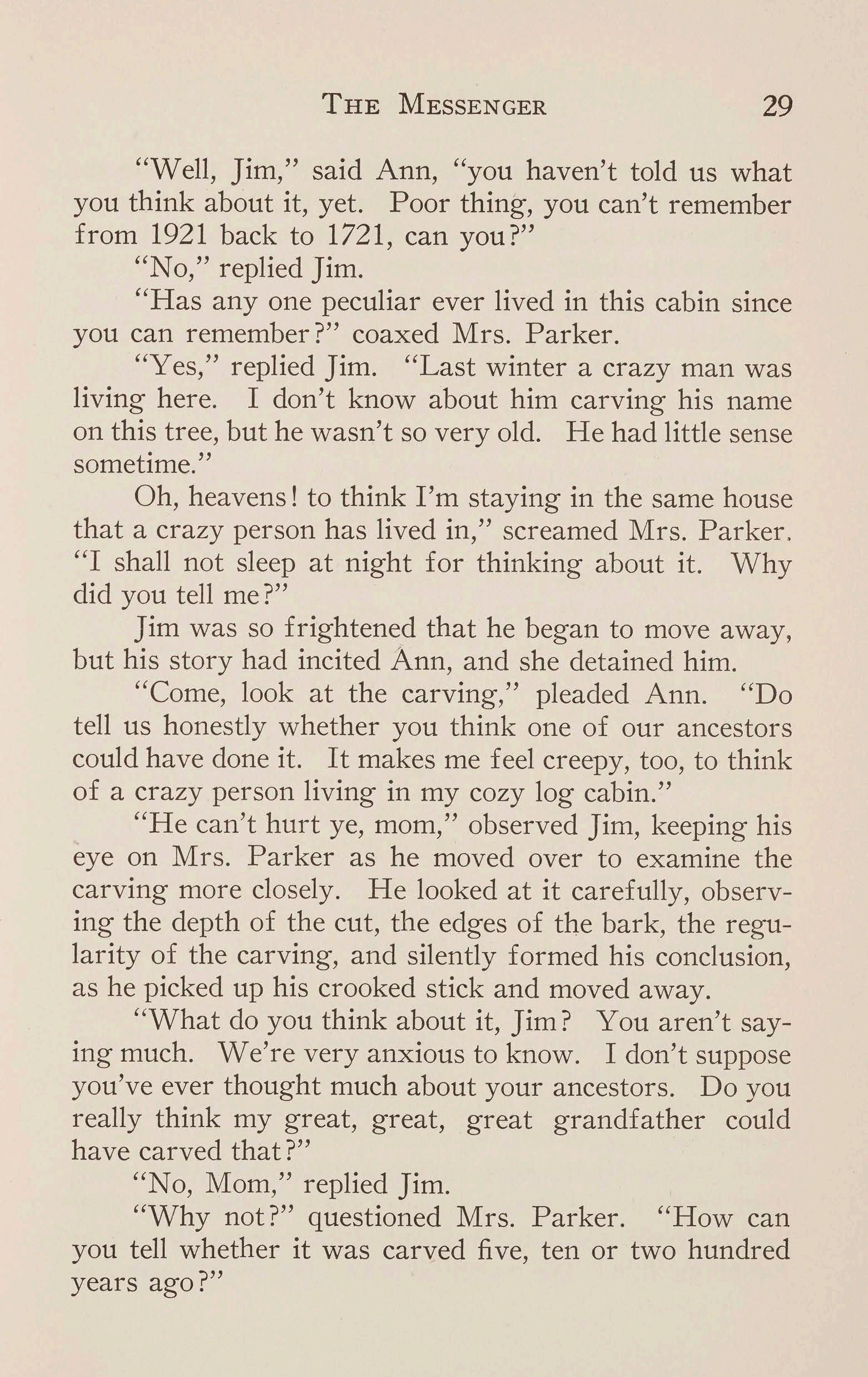
"Well, Jim," said Ann, "you haven't told us what you think about it, yet. Poor thing, you can't remember from 1921 back to 1721, can you?"
"No," replied Jim.
"Has any one peculiar ever lived in this cabin since you can remember?" coaxed Mrs. Parker.
"Yes," replied Jim. "Last winter a crazy man was living here. I don't know about him carving his name on this tree, but he wasn't so very old. He had little sense sometime.''
Oh, heavens! to think I'm staying in the same house that a crazy person has lived in," screamed Mrs. Parker. "I shall not sleep at night for thinking about it. Why did you tell me?"
Jim was so frightened that he began to move away, but his story had incited Ann, and she detained him.
"Come, look at the carving," pleaded Ann. "Do tell us honestly whether you think one of our ancestors could have done it. It makes me feel creepy, too, to think of a crazy person living in my cozy log cabin."
"He can't hurt ye, mom," observed Jim, keeping his eye on Mrs. Parker as he moved over to examine the carving more closely. He looked at it carefully, observing the depth of the cut, the edges of the bark, the regularity of the carving, and silently formed his conclusion, as he picked up his crooked stick and moved away.
"What do you think about it, Jim? You aren't saying much. We're very anxious to know. I don't suppose you've ever thought much about your ancestors. Do you really think my great, great, great grandfather could have carved that?"
"No, Mom," replied Jim.
"Why not?" questioned Mrs. Parker. "How can you tell whether it was carved five, ten or two hundred years ago?"
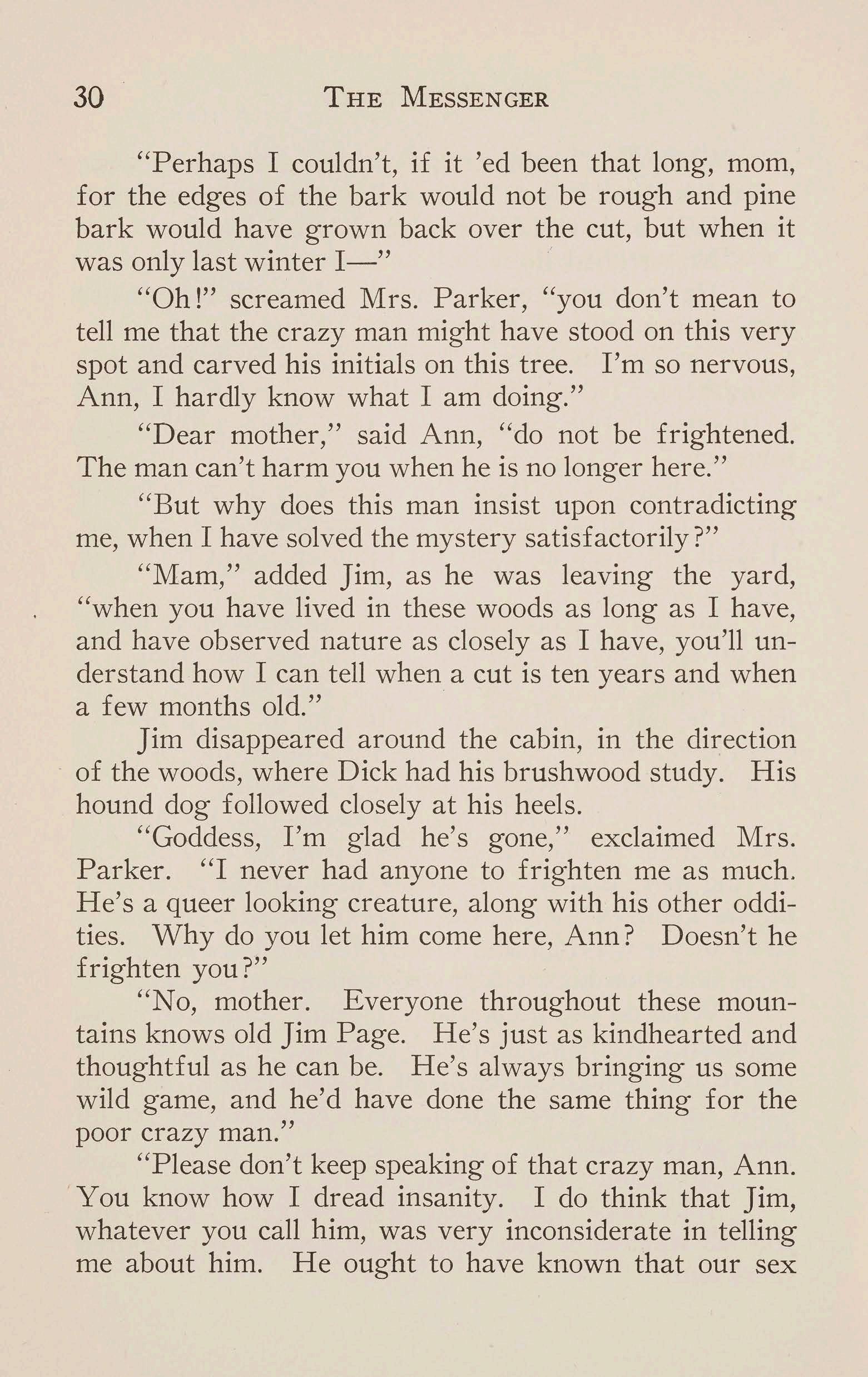
"Perhaps I couldn't, if it 'ed been that long, mom, for the edges of the bark would not be rough and pine bark would have grown back over the cut, but when it was only last winter I-"
"Oh!" screamed Mrs. Parker, "you don't mean to tell me that the crazy man might have stood on this very spot and carved his initials on this tree. I'm so nervous, Ann, I hardly know what I am doing."
"Dear mother," said Ann, "do not be frightened. The man can't harm you when he is no longer here."
"But why does this man insist upon contradicting me, when I have solved the mystery satisfactorily?"
"Mam," added Jim, as he was leaving the yard, "when you have lived in these woods as long as I have, and have observed nature as closely as I have, you'll understand how I can tell when a cut is ten years and when a few months old."
Jim disappeared around the cabin, in the direction of the woods, where Dick had his brushwood study. His hound dog followed closely at his heels.
"Goddess, I'm glad he's gone," exclaimed Mrs. Parker. "I never had anyone to frighten me as much. He's a queer looking creature, along with his other oddities. Why do you let him come here, Ann? Doesn't he frighten you?"
"No, mother. Everyone throughout these mountains knows old Jim Page. He's just as kindhearted and thoughtful as he can be. He's always bringing us some wild game, and he'd have done the same thing for the poor crazy man."
"Please don't keep speaking of that crazy man, Ann. You know how I dread insanity. I do think that Jim, whatever you call him, was very inconsiderate in telling me about him. He ought to have known that our sex

couldn't bear that kind of things. Men are so heartless, they never think of another's feelings in such matters. · Now, suppose that crazy man should return some day; just what would we do here practically alone, as long as Dick's over in those woods, where he can scarcely hear us when we call him? I wish my little Jim could be here. I've never had anything to worry me as much since he was killed, almost two years ago."
Jim Page reappeared around the corner of the house. He sat down quietly on a three-legged stool in the far corner of the yard, and began to whittle a stick.
"Why is this horrid man here again?" Mrs. Parker called to Ann, who had just gone into the house to start the kitchen fire. Ann was afraid her mother would insult poor old Jim, so she came out.
"Hush, mother. He often stays over here for dinner, especially when he brings us wild game. I must hurry, too. I suppose that's Dick I see. He's coming from that direction. I'll have dinner in a little while for you, Jim."
Ann picked up a few dry sticks around the yard and started to return to the kitchen, when, glancing in the direction she was expecting Dick, she perceived a strange looking, yet familiar man. His eyes seemed to glare. Jim picked up the squirrel and began to skin it carefully as the stranger approached.
"Still up to your old tricks, I see," the stranger observed. "I shall never forget the wild game you used to bring me."
Mrs. Parker was aroused by this voice. "My son, oh, my son!" she cried, as she rushed to the boy and threw her arms about his neck.
"Why, mom," stammered Jim, much frightened, "he's the crazy man I was telling ye about."
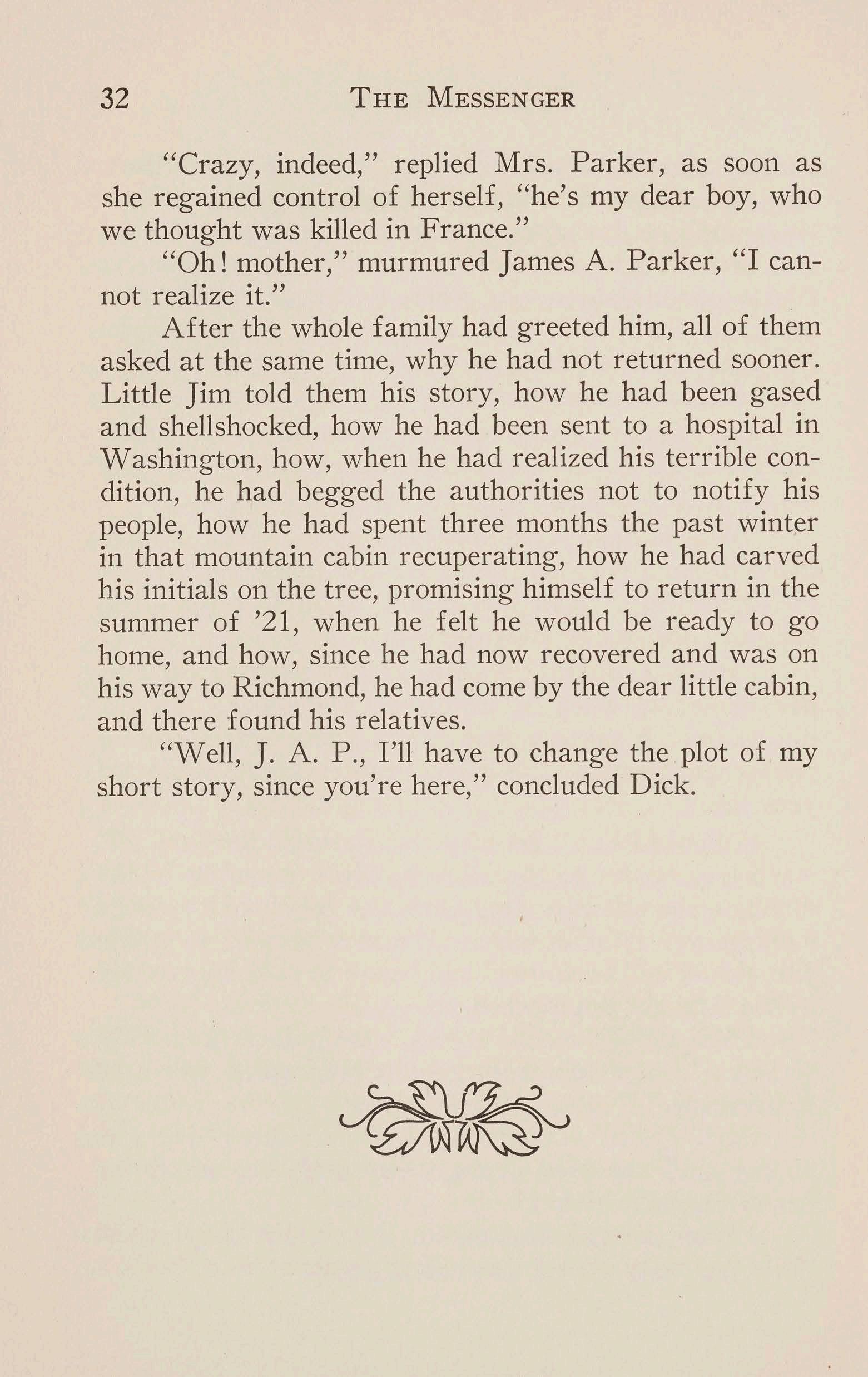
"Crazy, indeed," replied Mrs. Parker, as soon as she regained control of herself, "he's my dear boy, who we thought was killed in France."
"Oh! mother," murmured James A. Parker, "I cannot realize it."
After the whole family had greeted him, all of them asked at the same time, why he had not returned sooner. Little Jim told them his story, how he had been gased and shellshocked, how he had been sent to a hospital in Washington, how, when he had realized his terrible condition, he had begged the authorities not to notify his people, how he had spent three months the past winter in that mountain cabin recuperating, how he had carved his initials on the tree, promising himself to return in the summer of '21, when he felt he would be ready to go home, and how, since he had now recovered and was on his way to Richmond, he had come by the dear little cabin, and there found his relatives.
"Well, J. A. P., I'll have to change the plot of my short story, since you're here," concluded Dick.
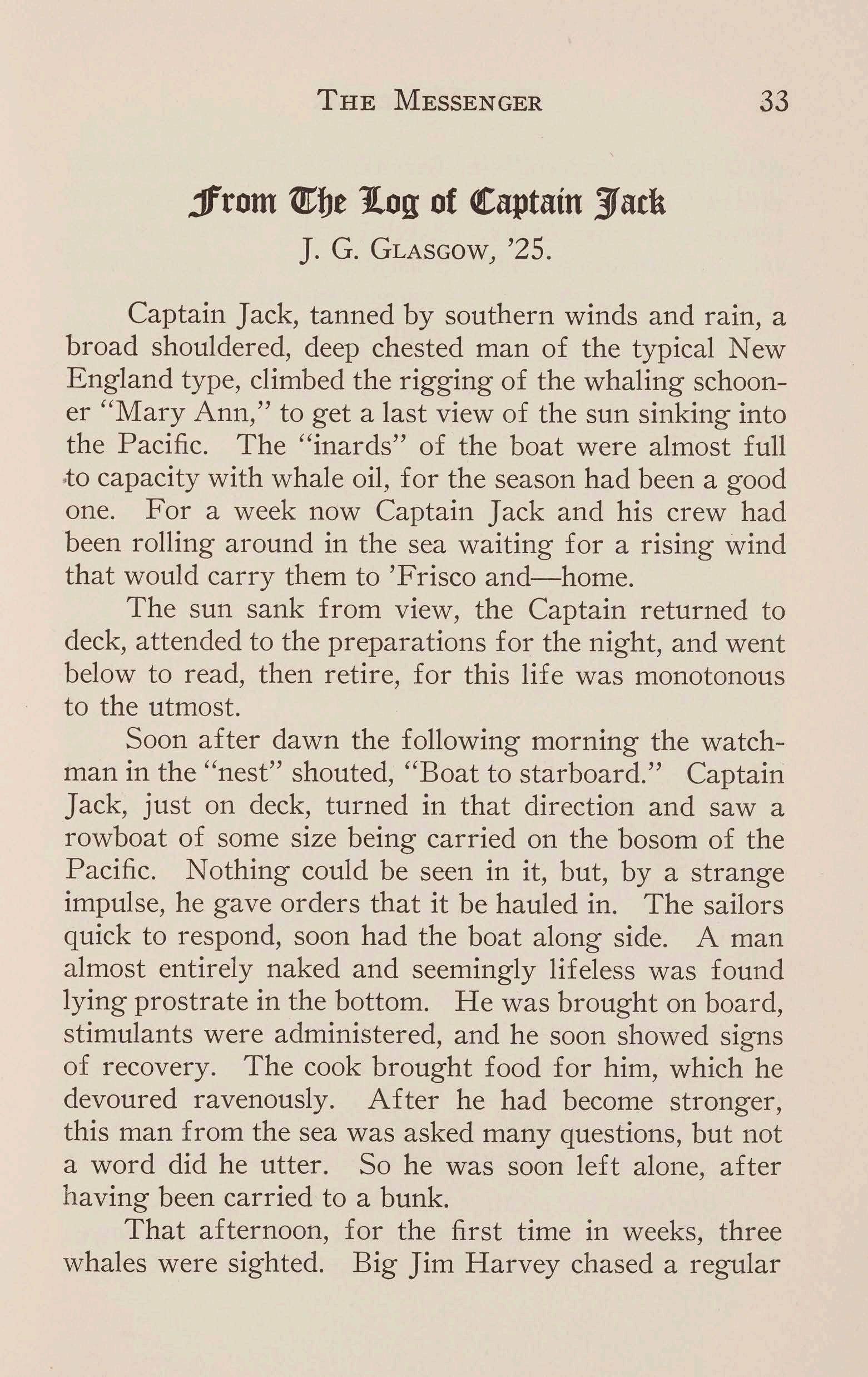
J. G. GLASGOW, '25.
Captain Jack, tanned by southern winds and rain, a broad shouldered, deep chested man of the typical New England type, climbed the rigging of the whaling schooner "Mary Ann," to get a last view of the sun sinking into the Pacific. The "inards" of the boat were almost full ,to capacity with whale oil, for the season had been a good one. For a week now Captain Jack and his crew had been rolling around in the sea waiting for a rising wind that would carry them to 'Frisco and-home.
The sun sank from view, the Captain returned to deck, attended to the preparations for the night, and went below to read, then retire, for this life was monotonous to the utmost.
Soon after dawn the following morning the watchman in the "nest" shouted, "Boat to starboard." Captain Jack, just on deck, turned in that direction and saw a rowboat of some size being carried on the bosom of the Pacific. Nothing could be seen in it, but, by a strange impulse, he gave orders that it be hauled in. The sailors quick to respond, soon had the boat along side. A man almost entirely naked and seemingly lifeless was found lying prostrate in the bottom. He was brought on board, stimulants were administered, and he soon showed signs of recovery. The cook brought food for him, which he devoured ravenously. After he had become stronger, this man from the sea was asked many questions, but not a word did he utter. So he was soon left alone, after having been carried to a bunk.
That afternoon, for the first time in weeks, three whales were sighted. Big Jim Harvey chased a regular
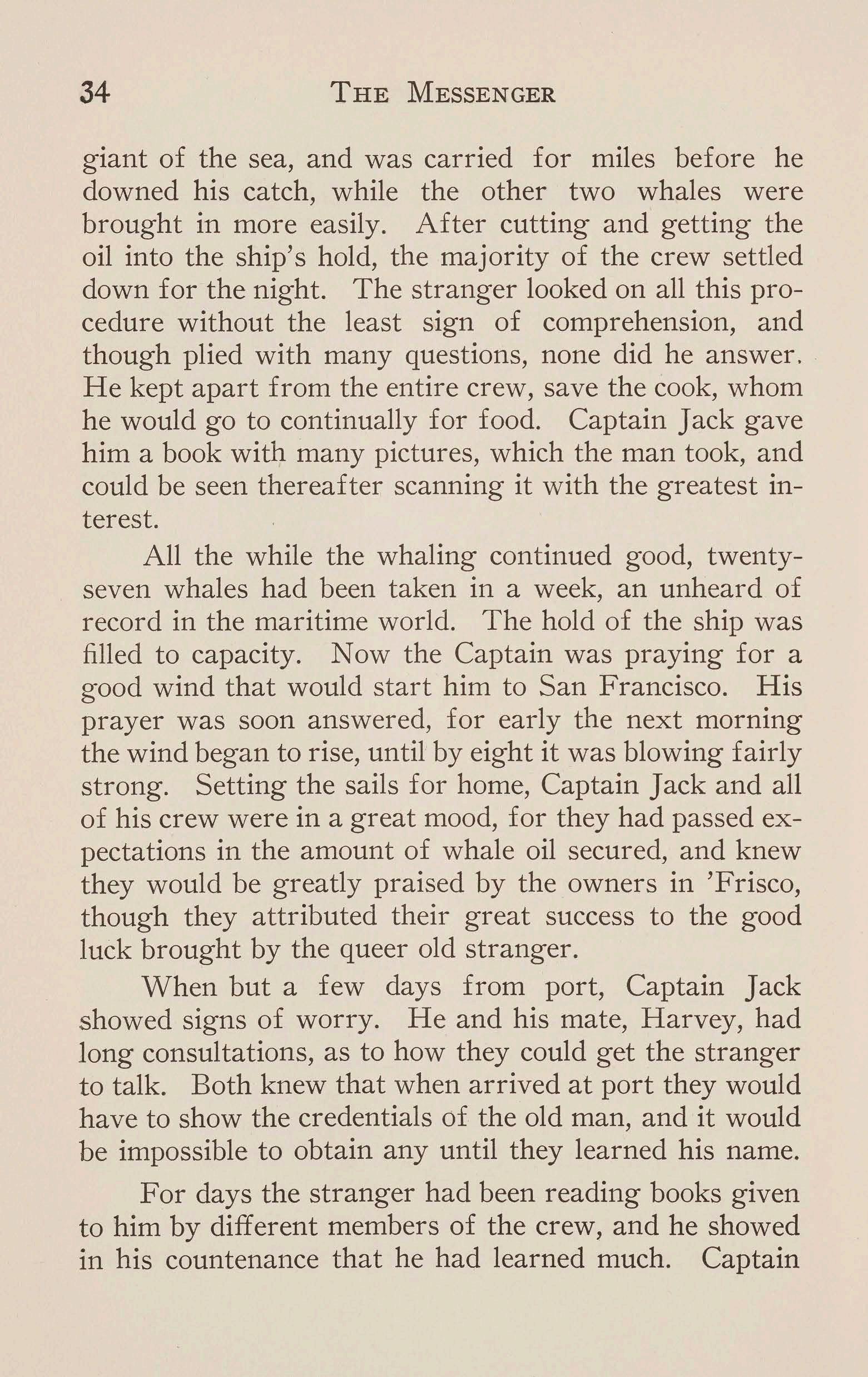
giant of the sea, and was carried for miles before he downed his catch, while the other two whales were brought in more easily. After cutting and getting the oil into the ship's hold, the majority of the crew settled down for the night. The stranger looked on all this procedure without the least sign of comprehension, and though plied with many questions, none did he answer. He kept apart from the entire crew, save the cook, whom he would go to continually for food. Captain Jack gave him a book with many pictures, which the man took, and could be seen thereafter scanning it with the greatest interest.
All the while the whaling continued good, twentyseven whales had been taken in a week, an unheard of record in the maritime world. The hold of the ship was filled to capacity. Now the Captain was praying for a good wind that would start him to San Francisco. His prayer was soon answered, for early the next morning the wind began to rise, until by eight it was blowing fairly strong. Setting the sails for home, Captain Jack and all of his crew were in a great mood, for they had passed expectations in the amount of whale oil secured, and knew they would be greatly praised by the owners in 'Frisco, though they attributed their great success to the good luck brought by the queer old stranger.
When but a few days from port, Captain Jack showed signs of worry. He and his mate, Harvey, had long consultations, as to how they could get the stranger to talk. Both knew that when arrived at port they would have to show the credentials of the old man, and it would be impossible to obtain any until they learned his name.
For days the stranger had been reading books given to him by different members of the crew, and he showed in his countenance that he had learned much. Captain
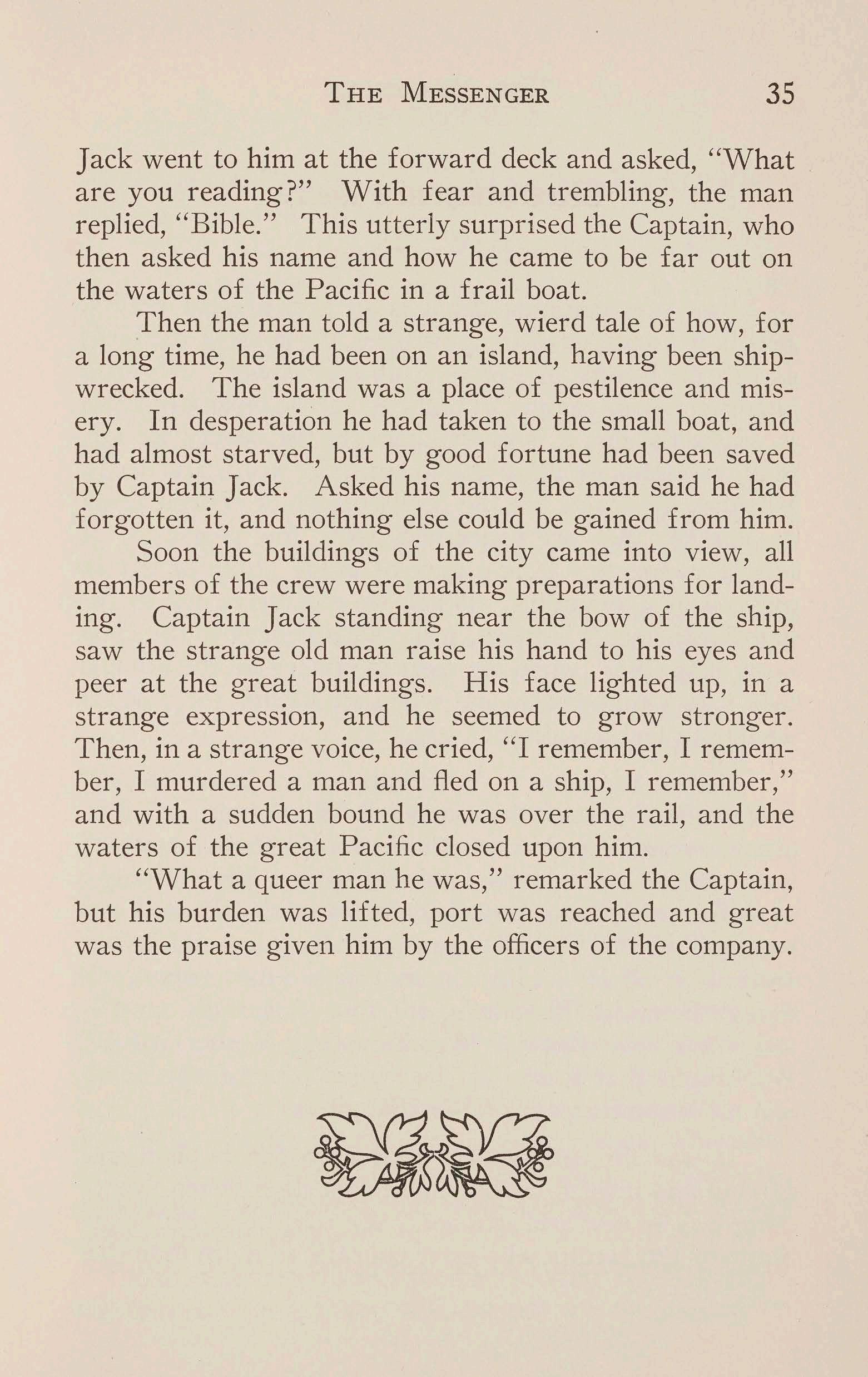
Jack went to him at the forward deck and asked, "What are you reading?" With fear and trembling, the man replied, "Bible." This utterly surprised the Captain, who then asked his name and how he came to be far out on the waters of the Pacific in a frail boat.
Then the man told a strange, wierd tale of how, for a long time, he had been on an island, having been shipwrecked. The island was a place of pestilence and misery. In desperation he had taken to the small boat, and had almost starved, but by good fortune had been saved by Captain Jack. Asked his name, the man said he had forgotten it, and nothing else could be gained from him. Soon the buildings of the city came into view, all members of the crew were making preparations for landing. Captain Jack standing near the bow of the ship, saw the strange old man raise his hand to his eyes and peer at the great buildings. His face lighted up, in a strange expression, and he seemed to grow stronger. Then, in a strange voice, he cried, "I remember, I remember, I murdered a man and fled on a ship, I remember," and with a sudden bound he was over the rail, and the waters of the great Pacific closed upon him.
"What a queer man he was," remarked the Captain, but his burden was lifted, port was reached and great was the praise given him by the officers of the company.
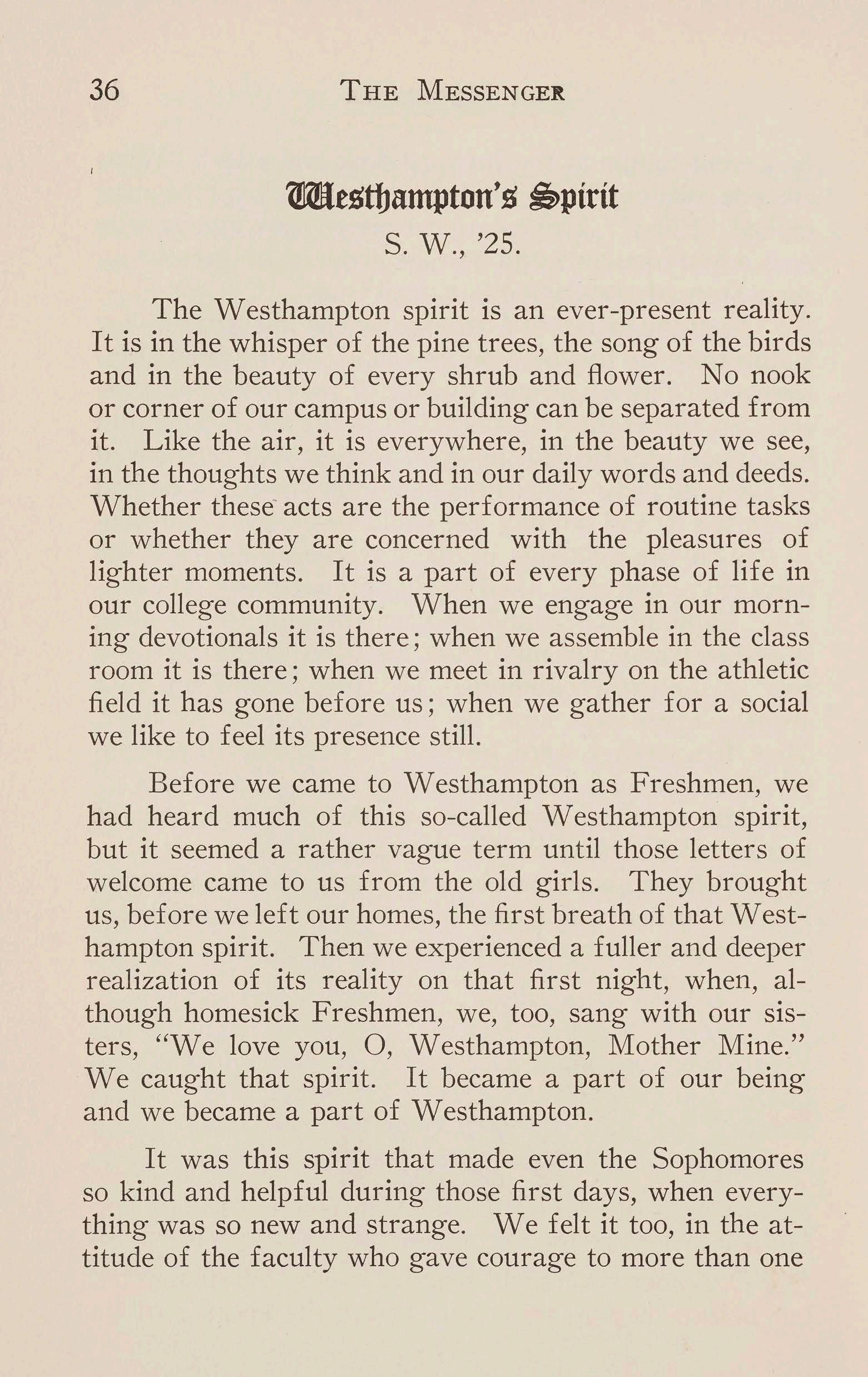
The Westhampton spirit is an ever-present reality. It is in the whisper of the pine trees, the song of the birds and in the beauty of every shrub and flower. No nook or corner of our campus or building can be separated from it. Like the air, it is everywhere, in the beauty we see, in the thoughts we think and in our daily words and deeds. Whether these · acts are the performance of routine tasks or whether they are concerned with the pleasures of lighter moments. It is a part of every phase of life in our college community. When we engage in our morning devotionals it is there; when we assemble in the class room it is there; when we meet in rivalry on the athletic field it has gone before us; when we gather for a social we like to feel its presence still.
Before we came to Westhampton as Freshmen, we had heard much of this so-called Vvesthampton spirit, but it seemed a rather vague term until those letters of welcome came to us from the old girls. They brought us, before we left our homes, the first breath of that Westhampton spirit. Then we experienced a fuller and deeper realization of its reality on that first night, when, although homesick Freshmen, we, too, sang with our sisters, "We love you, 0, Westhampton, Mother Mine." We caught that spirit. It became a part of our being and we became a part of Westhampton.
It was this spirit that made even the Sophomores so kind and helpful during those first days, when everything was so new and strange. We felt it too, in the attitude of the faculty who gave courage to more than one
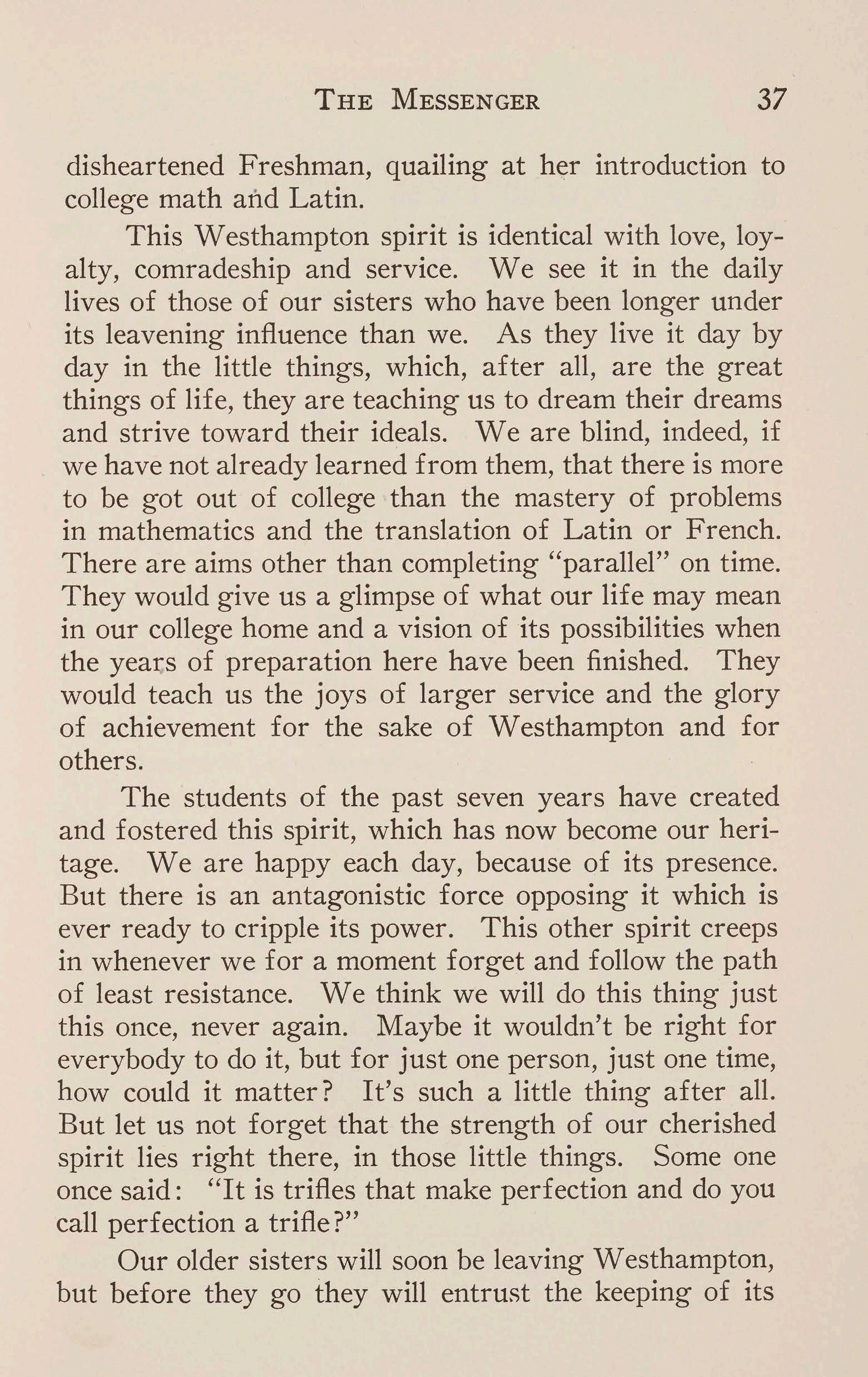
disheartened Freshman, quailing at her introduction to college math and Latin.
This Westhampton spirit is identical with love, loyalty, comradeship and service. We see it in the daily lives of those of our sisters who have been longer under its leavening influence than we. As they live it day by day in the little things, which, after all, are the great things of life, they are teaching us to dream their dreams and strive toward their ideals. We are blind, indeed, if we have not already learned from them, that there is more to be got out of college than the mastery of problems in mathematics and the translation of Latin or French. There are aims other than completing "parallel" on time. They would give us a glimpse of what our life may mean in our college home and a vision of its possibilities when the years of preparation here have been finished. They would teach us the joys of larger service and the glory of achievement for the sake of Westhampton and for others.
The students of the past seven years have created and fostered this spirit, which has now become our heritage. We are happy each day, because of its presence. But there is an antagonistic force opposing it which is ever ready to cripple its power. This other spirit creeps in whenever we for a moment forget and follow the path of least resistance. We think we will do this thing just this once, never again. Maybe it wouldn't be right for everybody to do it, but for just one person, just one time, how could it matter? It's such a little thing after all. But let us not forget that the strength of our cherished spirit lies right there, in those little things. Some one once said: "It is trifles that make perfection and do you call perfection a trifle?"
Our older sisters will soon be leaving Westhampton, but before they go they will entrust the keeping of its
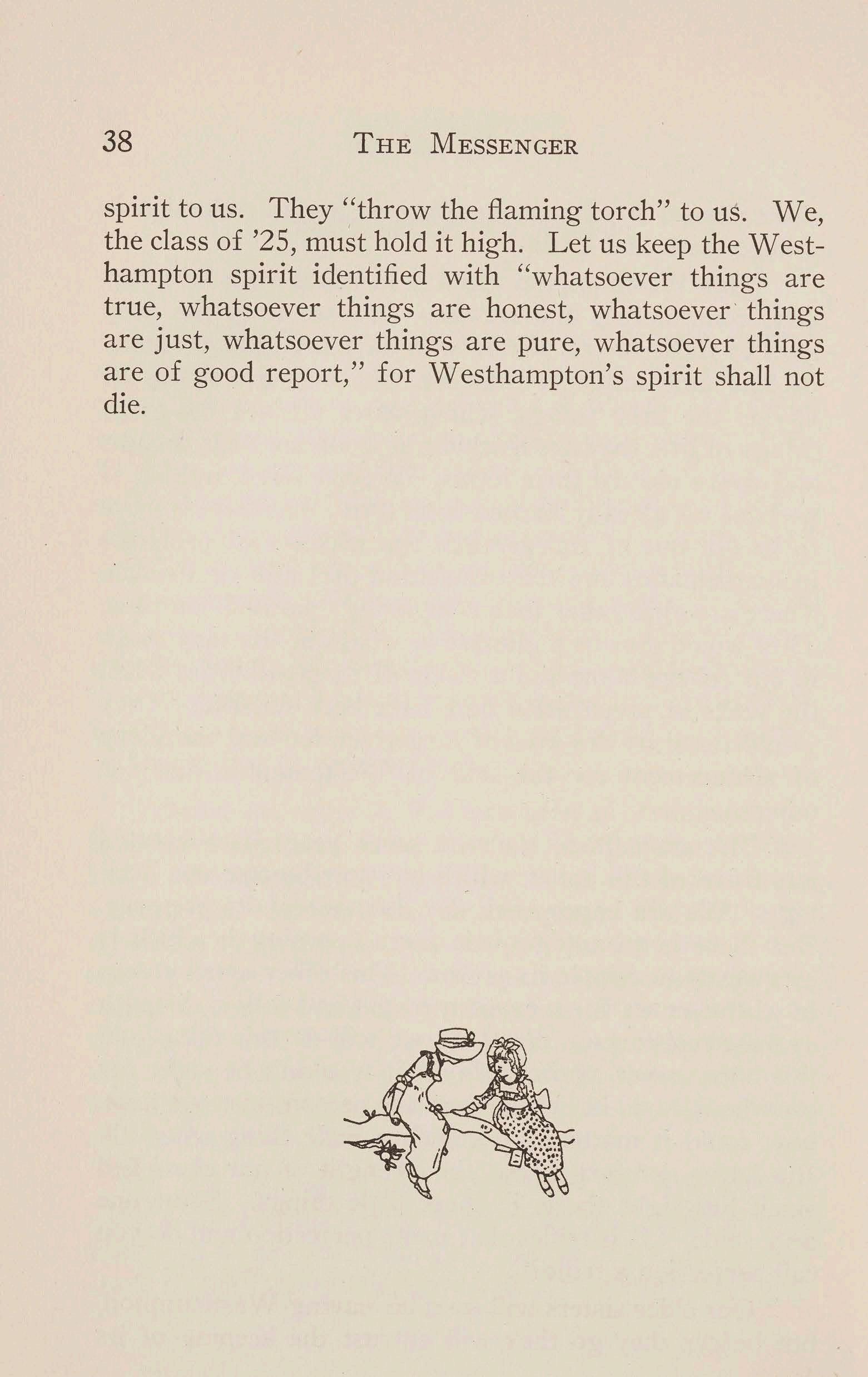
spirit to us. They "throw the flaming torch" to us. We, the class of '25, must hold it high. Let us keep the Westhampton spirit identified with "whatsoever things are true, whatsoever things are honest, whatsoever · things are just, whatsoever things are pure, whatsoever things are of good report," for Westhampton's spirit shall not die.
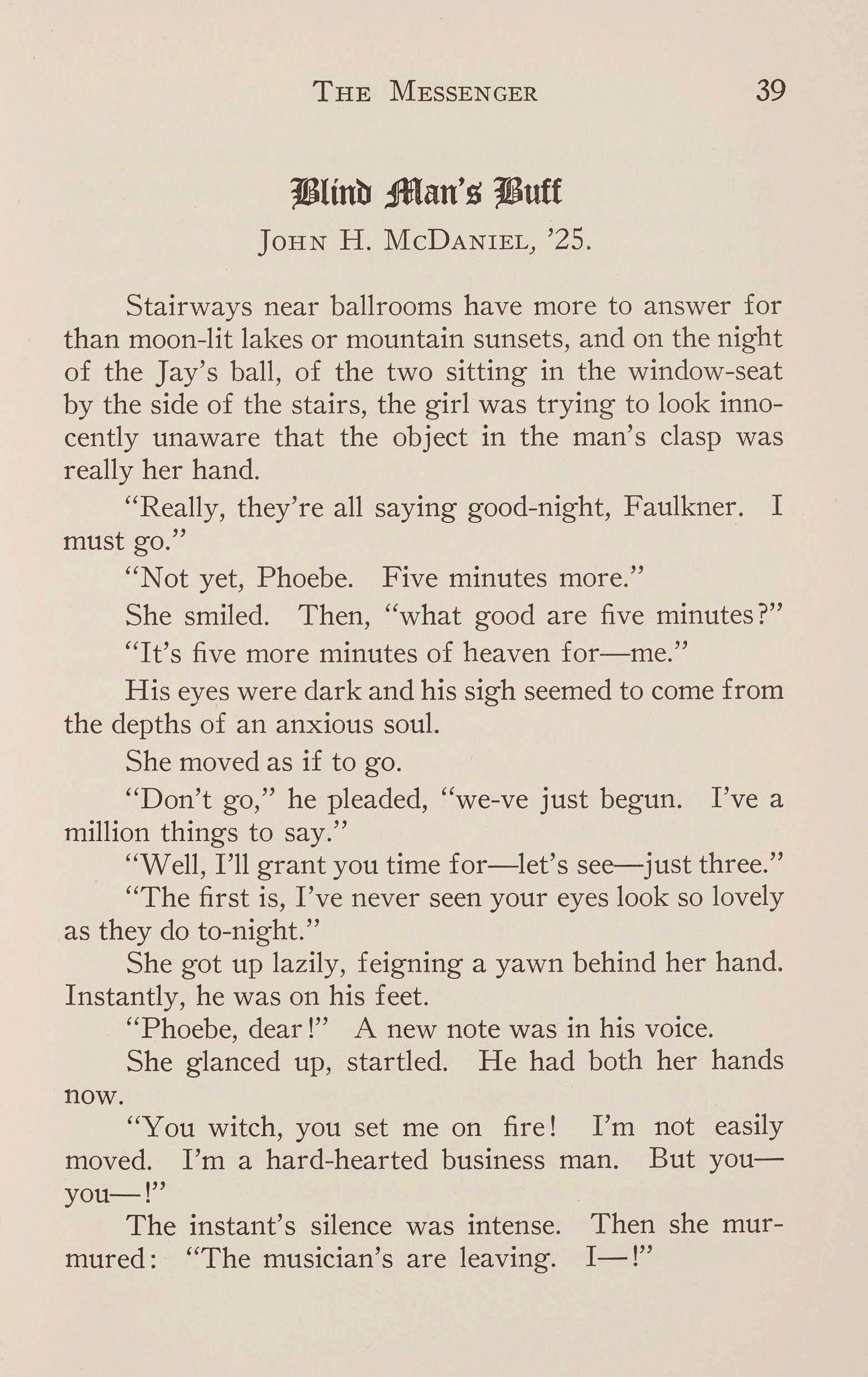
JoHN H. McDANIEL, '25.
Stairways near ballrooms have more to answer for than moon-lit lakes or mountain sunsets, and on the night of the Jay's ball, of the two sitting in the window-seat by the side of the stairs, the girl was trying to look innocently unaware that the object in the man's clasp was really her hand.
"Really, they're all saying good-night, Faulkner. I must go."
"Not yet, Phoebe. Five minutes more."
She smiled. Then, "what good are five minutes?"
"It's five more minutes of heaven for-me."
His eyes were dark and his sigh seemed to come from the depths of an anxious soul.
She moved as if to go.
"Don't go," he pleaded, "we-ve just begun. I've a million things to say."
"Well, I'll grant you time for-let's see--just three."
"The first is, I've never seen your eyes look so lovely as they do to-night."
She got up lazily, feigning a yawn behind her hand. Instantly, he was on his feet.
"Phoebe, dear!" A new note was in his voice.
She glanced up, startled. He had both her hands now.
"You witch, you set me on fire! I'm not easily moved. I'm a hard-hearted business man. But youyou-!"
The instant's silence was intense. Then she murmured: "The musician's are leaving. I-!"
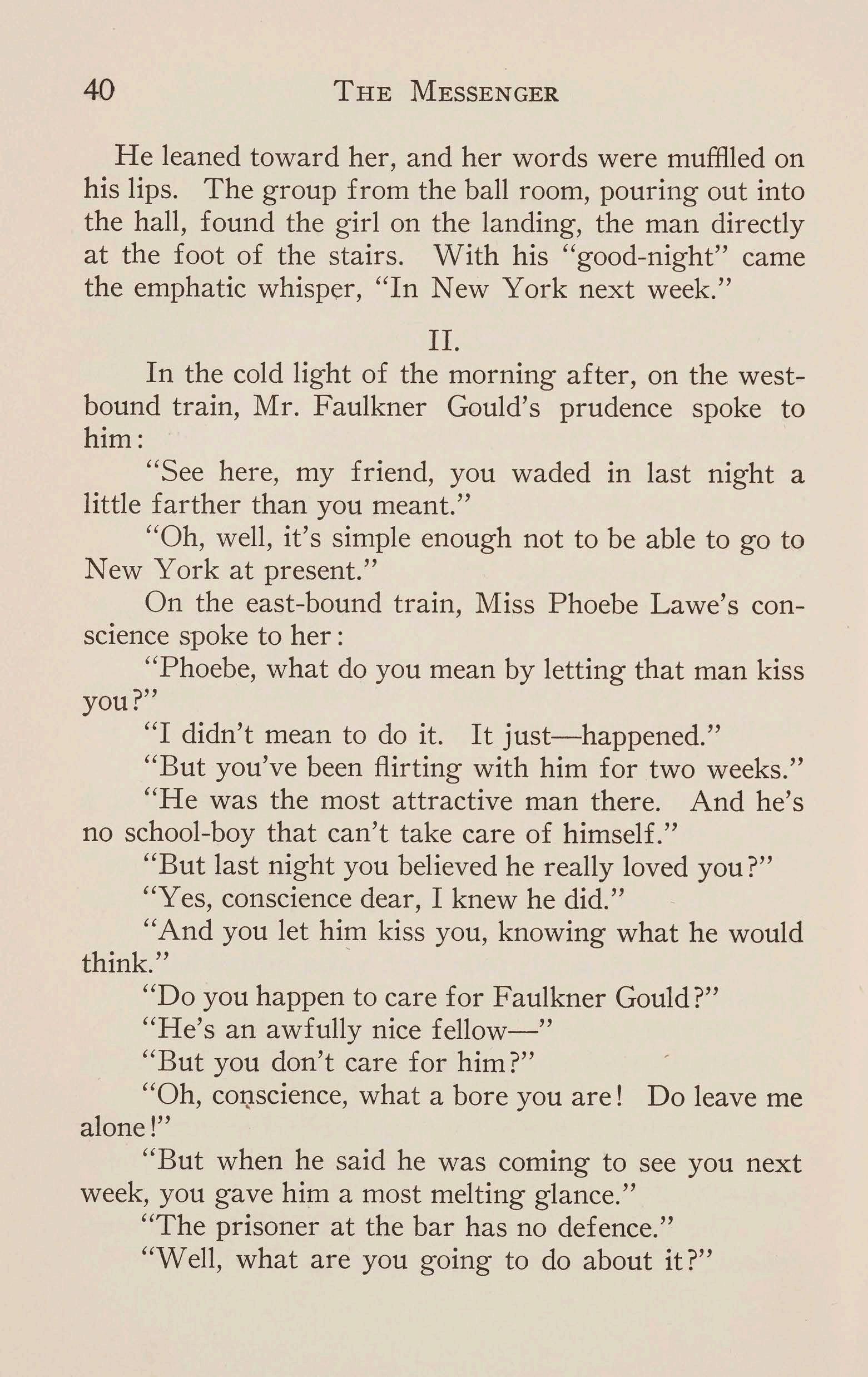
He leaned toward her, and her words were mufflled on his lips. The group from the ball room, pouring out into the hall, found the girl on the landing, the man directly at the foot of the stairs. With his "good-night" came the emphatic whisper, "In New York next week." II.
In the cold light of the morning after, on the westbound train, Mr. Faulkner Gould's prudence spoke to him:
"See here, my friend, you waded in last night a little farther than you meant."
"Oh, well, it's simple enough not to be able to go to New York at present."
On the east-bound train, Miss Phoebe Lawe's conscience spoke to her :
"Phoebe, what do you mean by letting that man kiss you?"
"I didn't mean to do it. It just-happened."
"But you've been flirting with him for two weeks."
"He was the most attractive man there. And he's no school-boy that can't take care of himself."
"But last night you believed he really loved you?"
"Yes, conscience dear, I knew he did."
"And you let him kiss you, knowing what he would think."
"Do you happen to care for Faulkner Gould?"
"He's an awfully nice fellow-"
"But you don't care for him?"
"Oh, col)science, what a bore you are! Do leave me alone!"
"But when he said he was coming to see you next week, you gave him a most melting glance."
"The prisoner at the bar has no defence."
"Well, what are you going to do about it?"
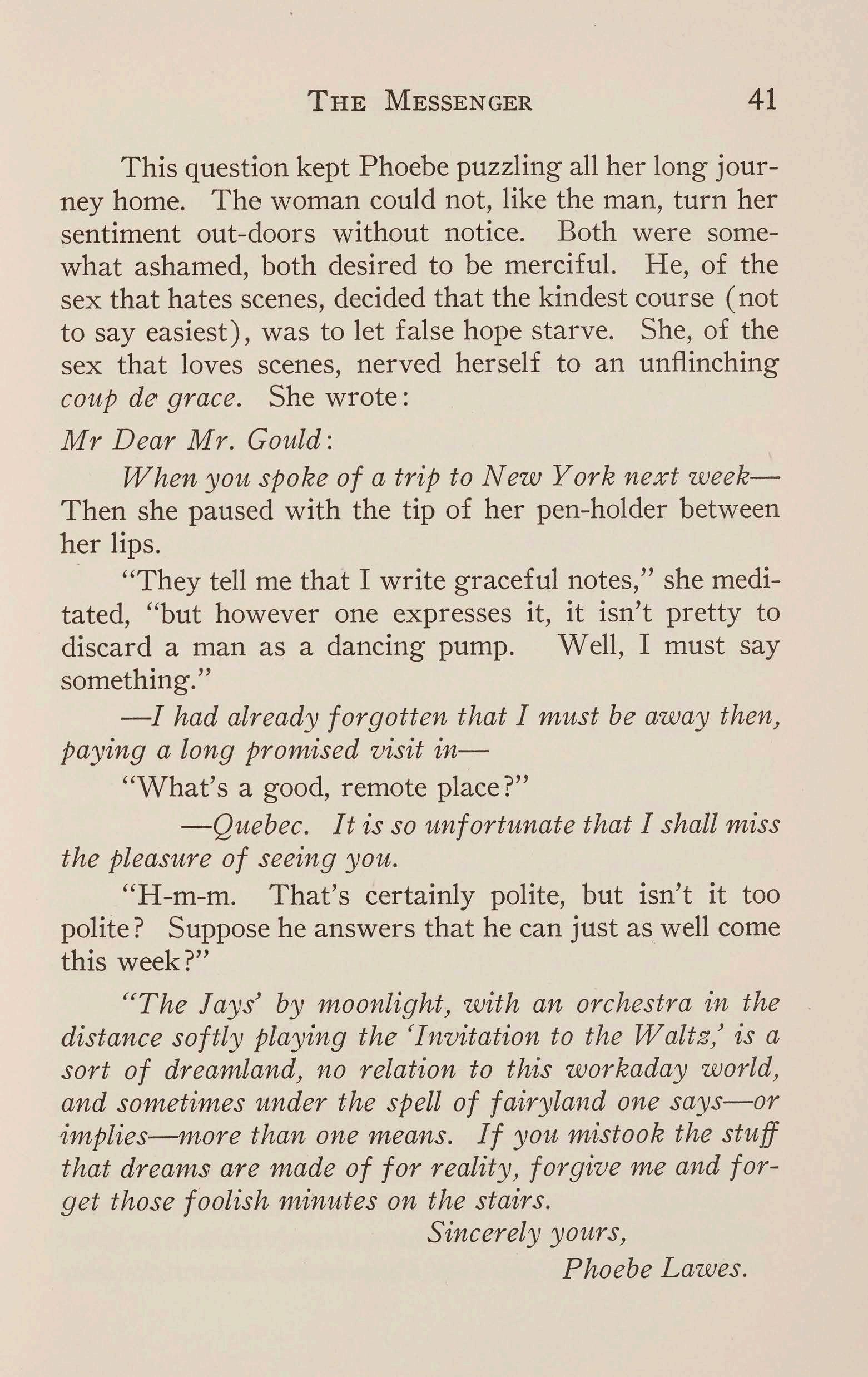
This question kept Phoebe puzzling all her long journey home. The woman could not, like the man, turn her sentiment out-doors without notice. Both were somewhat ashamed, both desired to be merciful. He, of the sex that hates scenes, decided that the kindest course ( not to say easiest), was to let false hope starve. She, of the sex that loves scenes, nerved herself to an unflinching coup de grace. She wrote:
Mr Dear Mr. Gould:
When you spoke of a trip to New York next weekThen she paused with the tip of her pen-holder between her lips.
"They tell me that I write graceful notes," she meditated, "but however one expresses it, it isn't pretty to discard a man as a dancing pump. Well, I must say something."
-I had already forgotten that I must be away then, paying a long promised visit in-
"What' s a good, remote place?" -Quebec. It is so unfortunate that I shall miss the pleasure of seeing you.
"H-m-m. That's certainly polite, but isn't it too polite? Suppose he answers that he can just as well come this week?"
"The Jays' by moonlight, with an orchestra in the distance softly playing the 'Invitation to the Waltz,' is a sort of dreamland, no relation to this workaday world, and sometimes under the spell of fairy land one says-or implies-more than one means. If you mistook the stuff that dreams are made of for reality, for give me and forget those foolish minutes on the stairs.
Sincerely yours, Phoebe Lawes.

III.
He hesitated a full minute to open her letter. What he found was so unlik e anything he had looked for, that he read it through three times without stopping. Then he ejaculated: "The little cat! So she was playing with me!"
He lighted a cigarette, and puffing thoughtfully, scanned the note a fourth time.
"By Jove, though, suppose she did care, and had the brains to see I didn't, and so shook me before I could shake her? Clever little devil! No, I'm hanged if she could think I didn't care, for I did-that night."
With his hands in his dressing-gown pockets, he arose to pace the floor.
"Yes, I jolly well meant it, that time on the stairs. She's pretty and merry, and quick and-as sharp-as a whiplash~ the dearest little pal in the world, and if I were a marrying man-." He stood still a moment, his face serious, and then laughed. "No, Phoebe, as Mr. and Mrs. Gould, I don't think we'd score a hit."
At his secretaire he read the letter a fifth time, and tossed it aside with an air of dismissal.
"I suppose I'm glad I'm out of a mess," he mused. "I know I'm glad she isn't hurt."
But a feeling he did not formulate inspired his reply-a distinct sense of injury as of a blow to his dignity -a resentment at the beastily impertinence of the little minx to dare to hand him his dismissal.
My Dear Miss Lawes:
You need hardly have taken the pains to explain the glamour of moonlight and the "Invitation to the Waltz ," for only the very young and callow suppose that anything said at a ball is meant. I have already forgotten wha#, happened on the stairs, but I remeniber that at the time
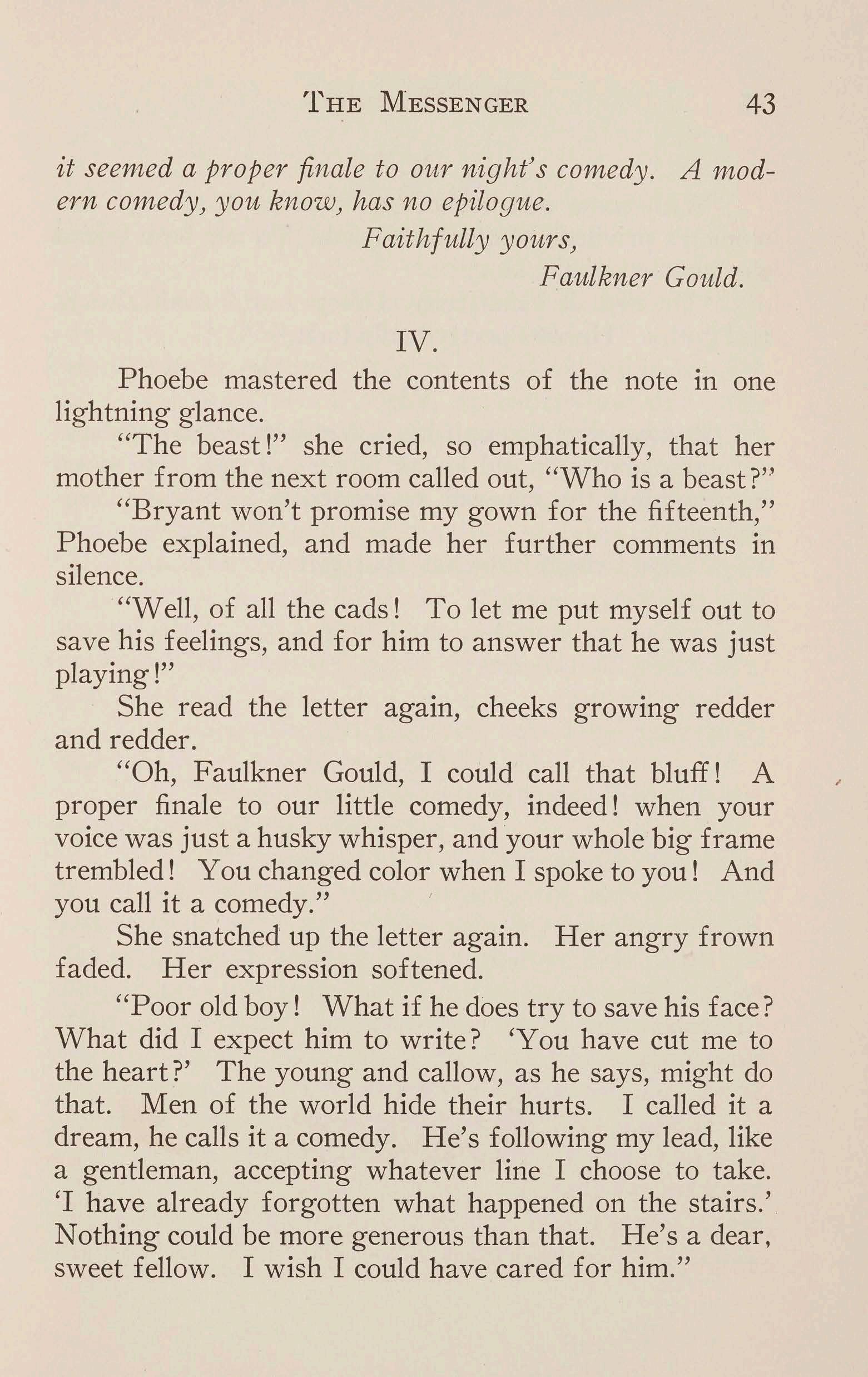
it seemed a proper finale to our night's comedy. A modern comedy, you know, has no epilogue.
Faithfully yours, Faulkner Gould.
IV.
Phoebe mastered the contents of the note in one lightning glance.
"The beast!" she cried, so emphatically, that her mother from the next room called out, "Who is a beast?''
"Bryant won't promise my gown for the fifteenth," Phoebe explained, and made her further comments in silence.
"Well, of all the cads! To let me put myself out to save his feelings, and for him to answer that he was just playing!"
She read the letter again, cheeks growing redder and redder.
"Oh, Faulkner Gould, I could call that bluff! A proper finale to our little comedy, indeed! when your voice was just a husky whisper, and your whole big frame trembled! You changed color when I spoke to you! And you call it a comedy."
She snatched up the letter again. Her angry frown faded. Her expression so£ten ed.
"Poor old boy! What if he does try to save his face? What did I expect him to write? 'You have cut me to the heart?' The young and callow, as he says, might do that. Men of the world hide their hurts. I called it a dream, he calls it a comedy. He's following my lead, like a gentleman, accepting whatever line I choose to take. 'I have already forgotten what happened on the stairs.' Nothing could be more generous than that. He's a dear, sweet fellow. I wish I could have cared for him."

With some self-denial, she decided to forego her woman's privilege of the last word. To her best friend she summed up the story:
"He took it beautifully, Dotty, but I shall always feel guilty. He was pretty badly hurt."
Rummaging through his secretaire one day, Faulkner came across an old kodak picture of her. He stood it up against the ink-well, to regard it with some complacency.
"Now I could have had that girl."
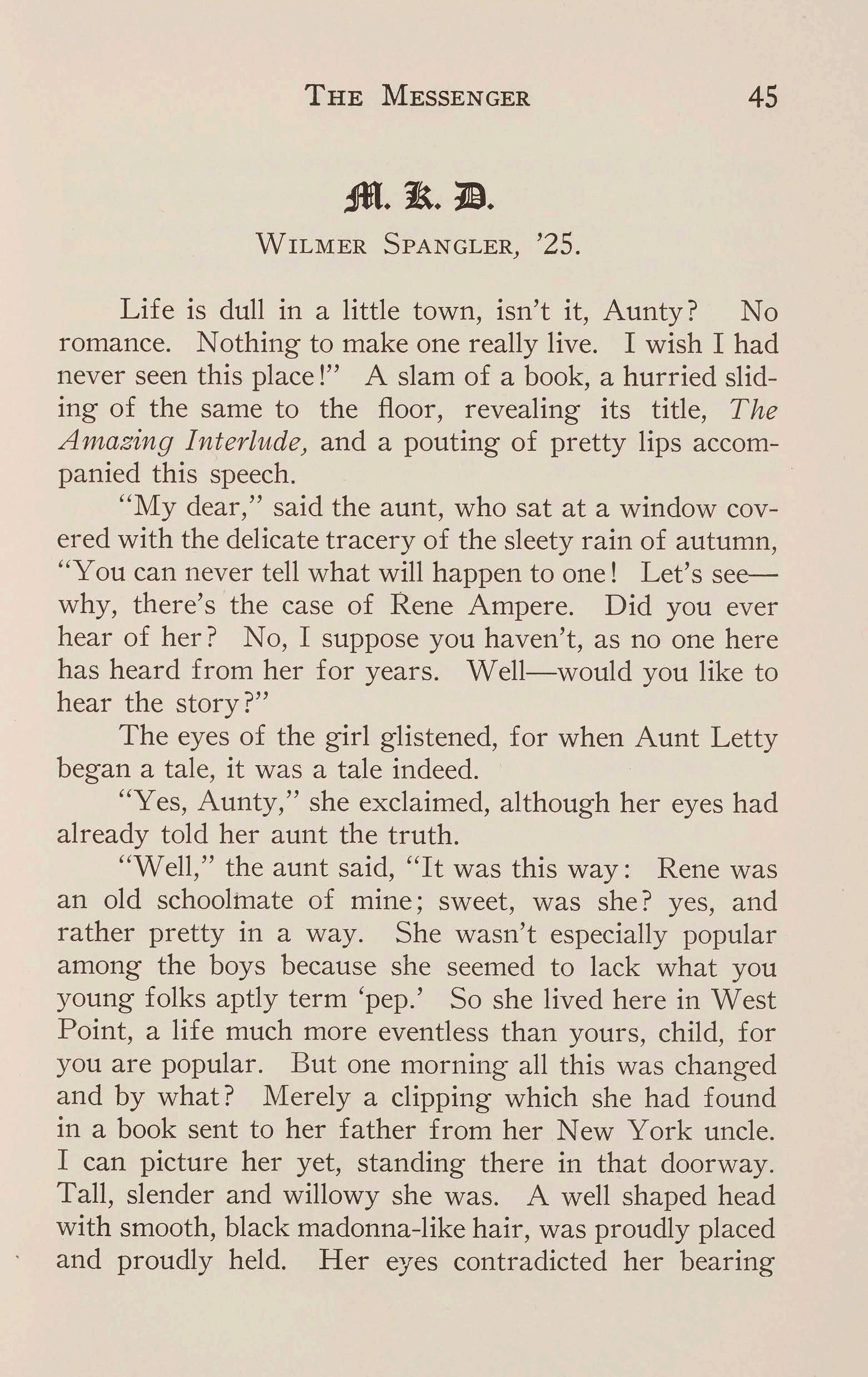
WILMER SPANGLER,
'25.
Life is dull in a little town, isn't it, Aunty? No romance. Nothing to make one really live. I wish I had never seen this place!" A slam of a book, a hurried sliding of the same to the floor, revealing its title, The A mazing Interlude, and a pouting of pretty lips accompanied this speech.
"My dear," said the aunt, who sat at a window covered with the delicate tracery of the sleety rain of autumn, "You can never tell what will happen to one! Let's seewhy, there's the case of Rene Ampere. Did you ever hear of her? No, I suppose you haven't, as no one here has heard from her for years. Well-would you like to hear the story?"
The eyes of the girl glistened, for when Aunt Letty began a tale, it was a tale indeed.
"Yes, Aunty," she exclaimed, although her eyes had already told her aunt the truth.
"Well," the aunt said, "It was this way: Rene was an old schoolmate of mine; sweet, was she? yes, and rather pretty in a way. She wasn't especially popular among the boys because she seemed to lack what you young folks aptly term 'pep.' So she lived here in West Point, a life much more eventless than yours, child, for you are popular. But one morning all this was changed and by what? l\,ferely a clipping which she had found in a book sent to her father from her New York uncle. I can picture her yet, standing there in that doorway. Tall, slender and willowy she was. A well shaped head with smooth, black madonna-like hair, was proudly placed and proudly held. Her eyes contradicted her bearing
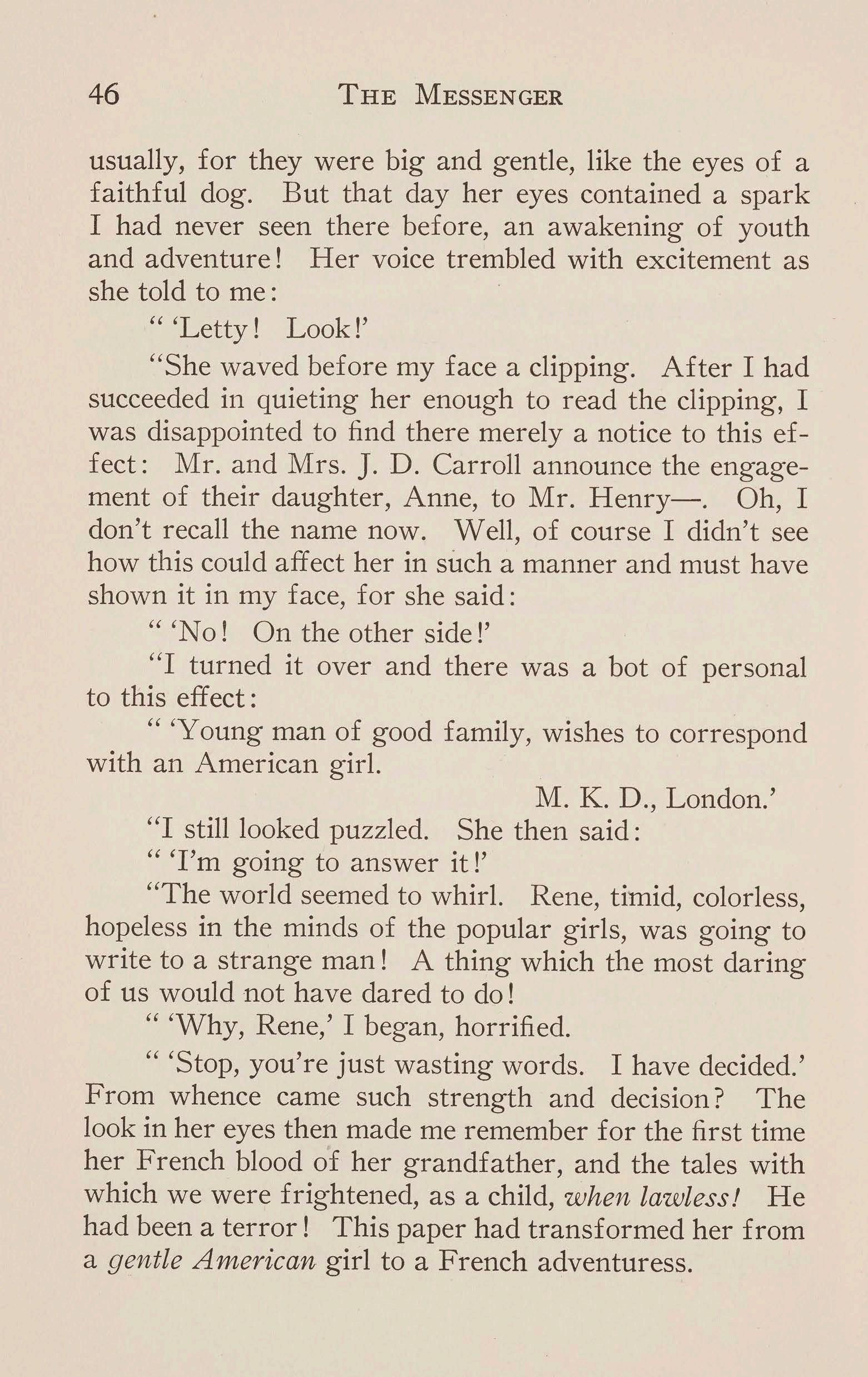
usually, for they were big and gentle, like the eyes of a faithful dog. But that day her eyes contained a spark I had never seen there before, an awakening of youth and adventure! Her voice trembled with excitement as she told to me :
" 'Letty ! Look !'
"She waved before my face a clipping. After I had succeeded in quieting her enough to read the clipping, I was disappointed to find there merely a notice to this effect: Mr. and Mrs. J. D. Carroll announce the engagement of their daughter, Anne, to Mr. Henry-. Oh, I don't recall the name now. Well, of course I didn't see how this could affect her in such a manner and must have shown it in my face, for she said:
" 'No ! On the other side !'
"I turned it over and there was a bot of personal to this effect :
"'Young man of good family, wishes to correspond with an American girl.
M. K. D., London.'
"I still looked puzzled. She then said : "'I'm going to answer it!'
"The world seemed to whirl. Rene, timid, colorless, hopeless in the minds of the popular girls, was going to write to a strange man! A thing which the most daring of us would not have dared to do!
"'Why, Rene,' I began, horrified.
" 'Stop, you're just wasting words. I have decided.' From whence came such strength and decision? The look in her eyes then made me remember for the first time her French blood of her grandfather, and the tales with which we were frightened, as a child, when lawless! He had been a terror!
This paper had transformed her from a gentle American girl to a French adventuress.
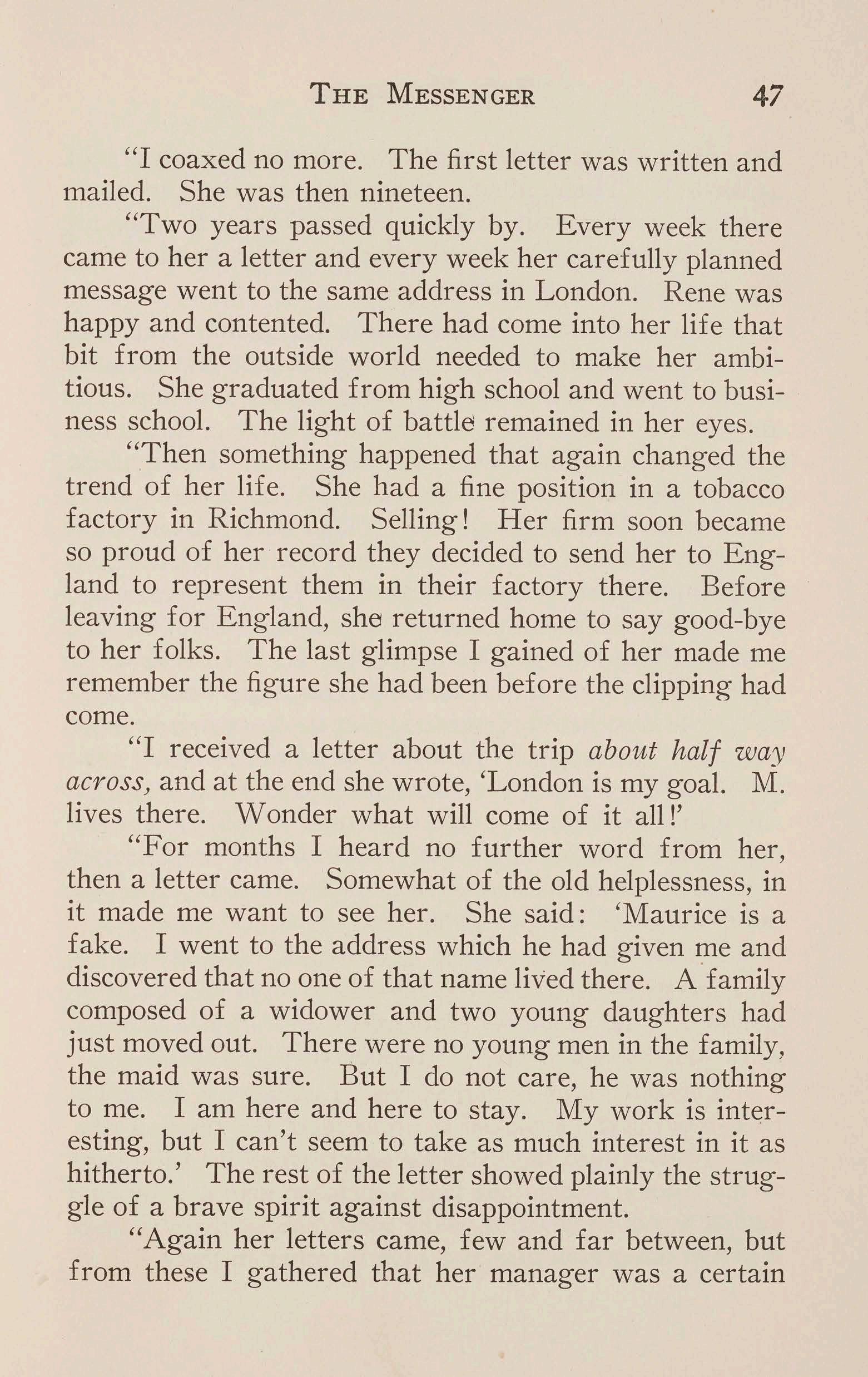
"I coaxed no more. The first letter was written and mailed. She was then nineteen.
"Two years passed quickly by. Every week there came to her a letter and every week her carefully planned message went to the same address in London. Rene was happy and contented. There had come into her life that bit from the outside world needed to make her ambitious. She graduated from high school and went to business school. The light of battle remained in her eyes.
"Then something happened that again changed the trend of her life. She had a fine position in a tobacco factory in Richmond. Selling! Her firm soon became so proud of her record they decided to send her to England to represent them in their factory there. Before leaving for England, she returned home to say good-bye to her folks. The last glimpse I gained of her made me remember the figure she had been before the clipping had come.
"I received a letter about the trip about half way across, and at the end she wrote, 'London is my goal. M. lives there. Wonder what will come of it all!'
"For months I heard no further word from her, then a letter came. Somewhat of the old helplessness, in it made me want to see her. She said: 'Maurice is a fake. I went to the address which he had given me and discovered that no one of that name lived there. A family composed of a widower and two young daughters had just moved out. There were no young men in the family, the maid was sure. But I do not care, he was nothing to me. I am here and here to stay. My work is interesting, but I can't seem to take as much interest in it as hitherto.' The rest of the letter showed plainly the struggle of a brave spirit against disappointment.
"Again her letters came, few and far between, but from these I gathered that her manager was a certain
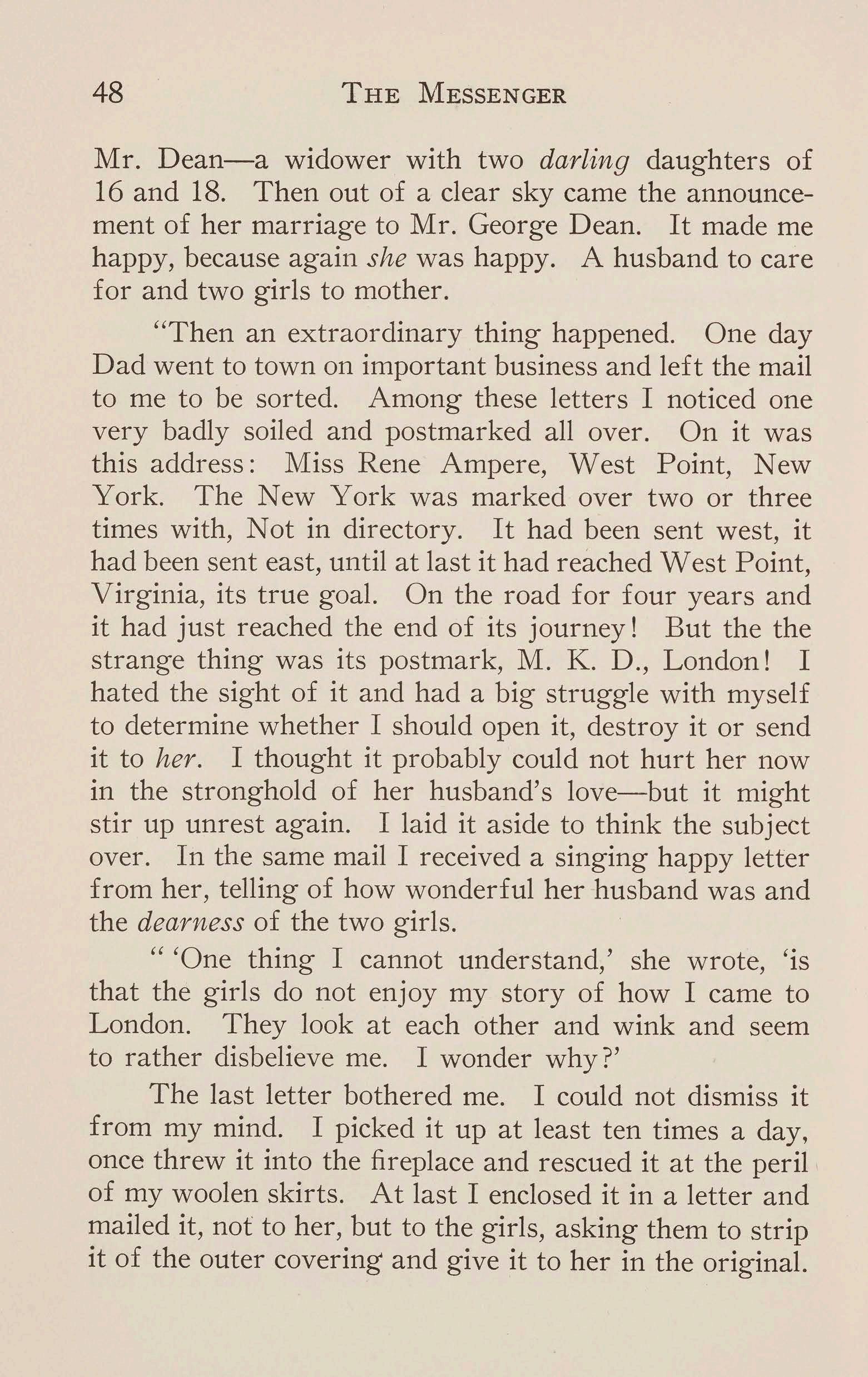
Mr. Dean-a widower with two darling daughters of 16 and 18. Then out of a clear sky came the announcement of her marriage to Mr. George Dean. It made me happy, because again she was happy. A husband to care for and two girls to mother.
"Then an extraordinary thing happened. One day Dad went to town on important business and left the mail to me to be sorted. Among these letters I noticed one very badly soiled and postmarked all over. On it was this address: Miss Rene Ampere, West Point, New York. The New York was marked over two or three times with, Not in directory. It had been sent west, it had been sent east, until at last it had reached West Point, Virginia, its true goal. On the road for four years and it had just reached the end of its journey! But the the strange thing was its postmark, M. K. D., London! I hated the sight of it and had a big struggle with myself to determine whether I should open it, destroy it or send it to her. I thought it probably could not hurt her now in the stronghold of her husband's love-but it might stir up unrest again. I laid it aside to think the subject over. In the same mail I received a singing happy letter from her, telling of how wonderful her husband was and the dearness of the two girls.
"'One thing I cannot understand,' she wrote, 'is that the girls do not enjoy my story of how I came to London. They look at each other and wink and seem to rather disbelieve me. I wonder why?'
The last letter bothered me. I could not dismiss it from my mind. I picked it up at least ten times a day, once threw it into the fireplace and rescued it at the peril of my woolen skirts. At last I enclosed it in a letter and mailed it, not to her, but to the girls, asking them to strip it of the outer covering and give it to her in the original.
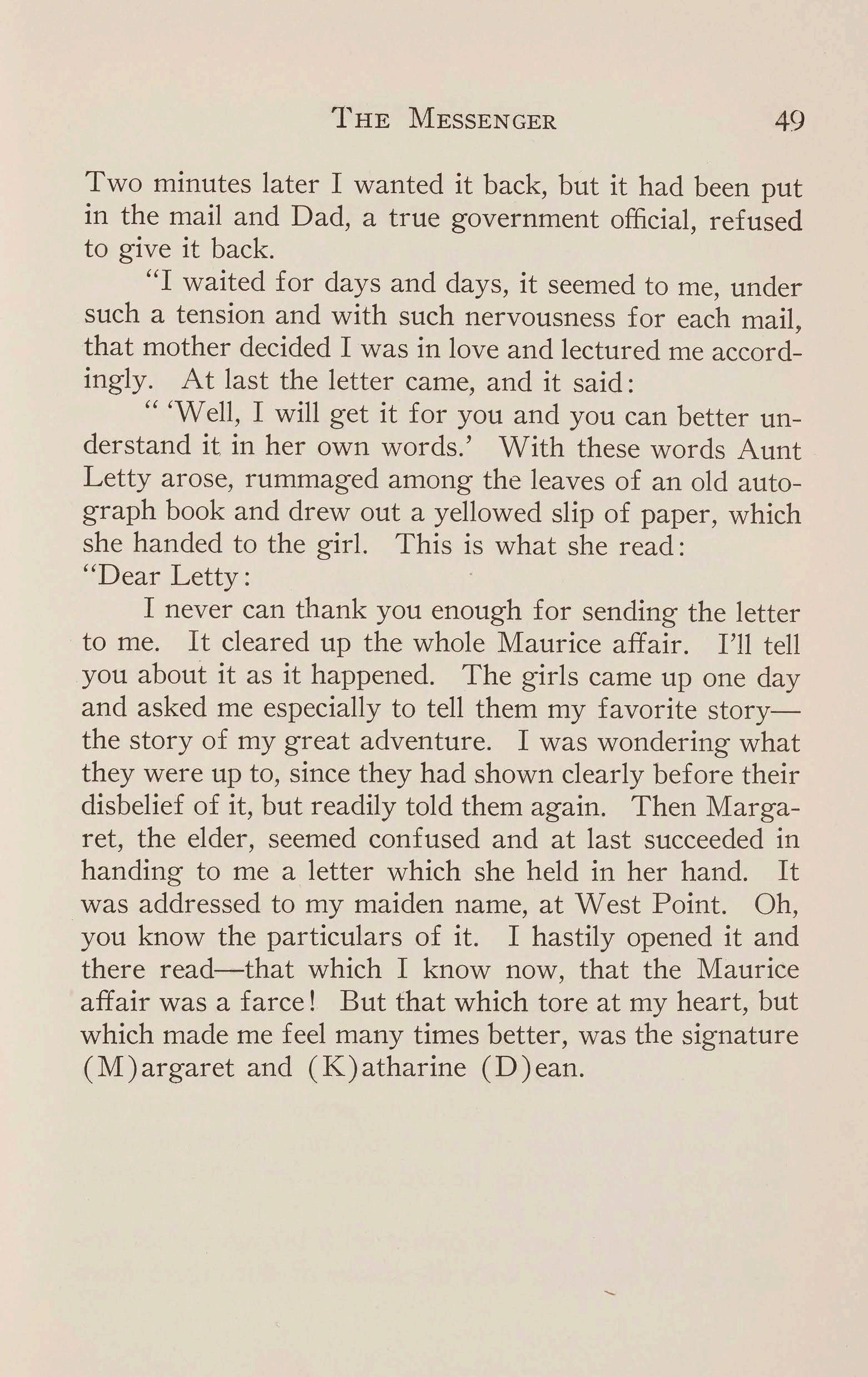
Two minutes later I wanted it back, but it had been put in the mail and Dad, a true government official, refused to give it back.
"I waited for days and days, it seemed to me, under such a tension and with such nervousness for each mail, that mother decided I was in love and lectured me accordingly. At last the letter came, and it said:
"'Well, I will get it for you and you can better understand it in her own words.' With these words Aunt Letty arose, rummaged among the leaves of an old autograph book and drew out a yellowed slip of paper, which she handed to the girl. This is what she read:
"Dear Letty:
I never can thank you enough for sending the letter to me. It cleared up the whole Maurice affair. I'll tell you about it as it happened. The girls came up one day and asked me especially to tell them my favorite storythe story of my great adventure. I was wondering what they were up to, since they had shown clearly before their disbelief of it, but readily told them again. Then Margaret, the elder, seemed confused and at last succeeded in handing to me a letter which she held in her hand. It was addressed to my maiden name, at West Point. Oh, you know the particulars of it. I hastily opened it and there read-that which I know now, that the Maurice affair was a farce! But that which tore at my heart, but which made me feel many times better, was the signature (M)argaret and (K)atharine (D)ean.
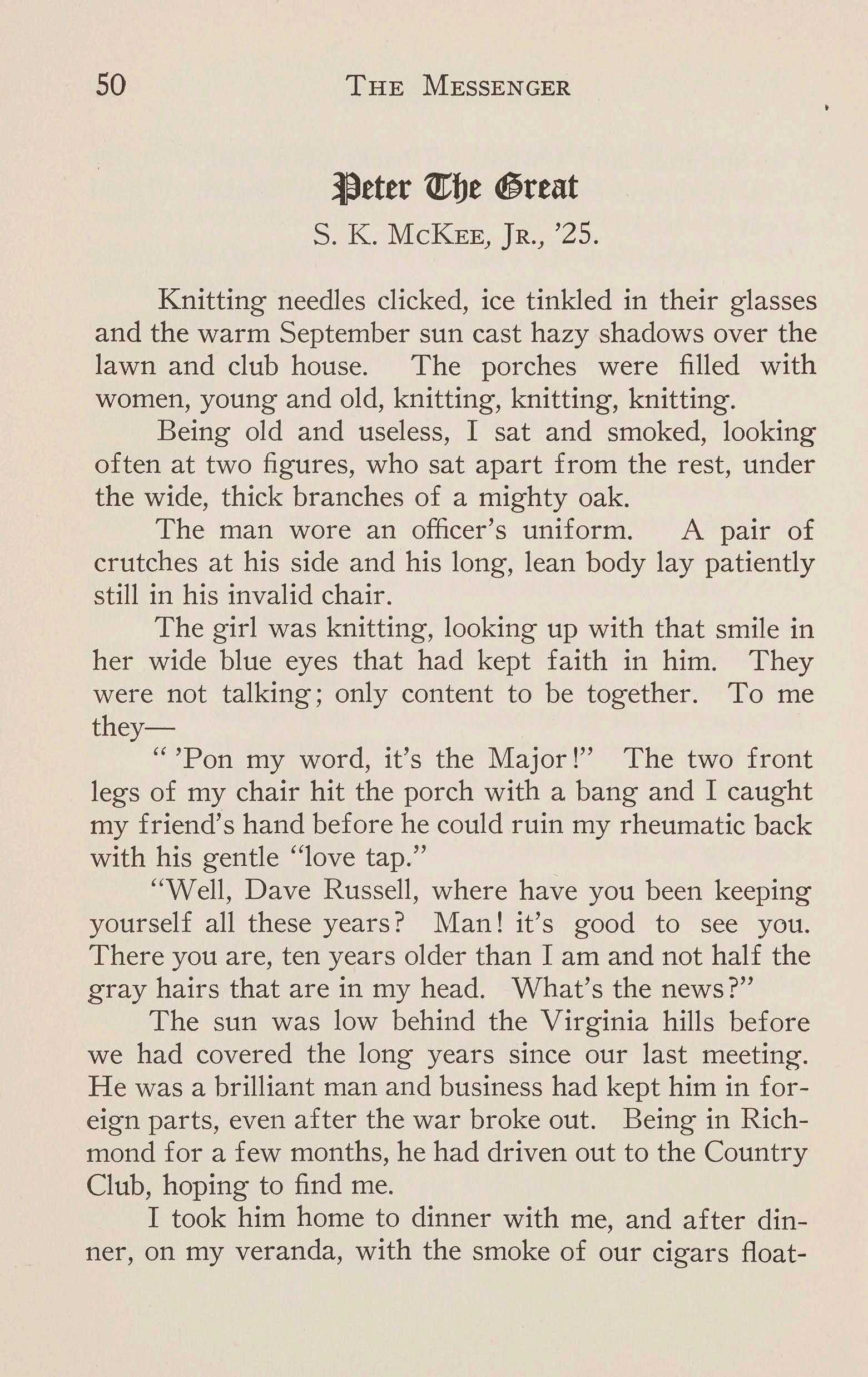
S. K. McKEE) JR.)'25.
Knitting needles clicked, ice tinkled in their glasses and the warm September sun cast hazy shadows over the lawn and club house. The porches were filled with women, young and old, knitting, knitting, knitting. Being old and useless, I sat and smoked, looking often at two figures, who sat apart from the rest, under the wide, thick branches of a mighty oak.
The man wore an officer's uniform. A pair of crutches at his side and his long, lean body lay patiently still in his invalid chair.
The girl was knitting, looking up with that smile in her wide blue eyes that had kept faith in him. They were not talking; only content to be together. To me they-
" 'Pon my word, it's the Major!" The two front legs of my chair hit the porch with a bang and I caught my friend's hand before he could ruin my rheumatic back with his gentle "love tap."
"Well, Dave Russell, where have you been keeping yourself all these years? Man! it's good to see you. There you are, ten years older than I am and not half the gray hairs that are in my head. What's the news?"
The sun was low behind the Virginia hills before we had covered the long years since our last meeting. He was a brilliant man and business had kept him in foreign parts, even after the war broke out. Being in Richmond for a few months, he had driven out to the Country Club, hoping to find me.
I took him home to dinner with me, and after dinner, on my veranda, with the smoke of our cigars float-
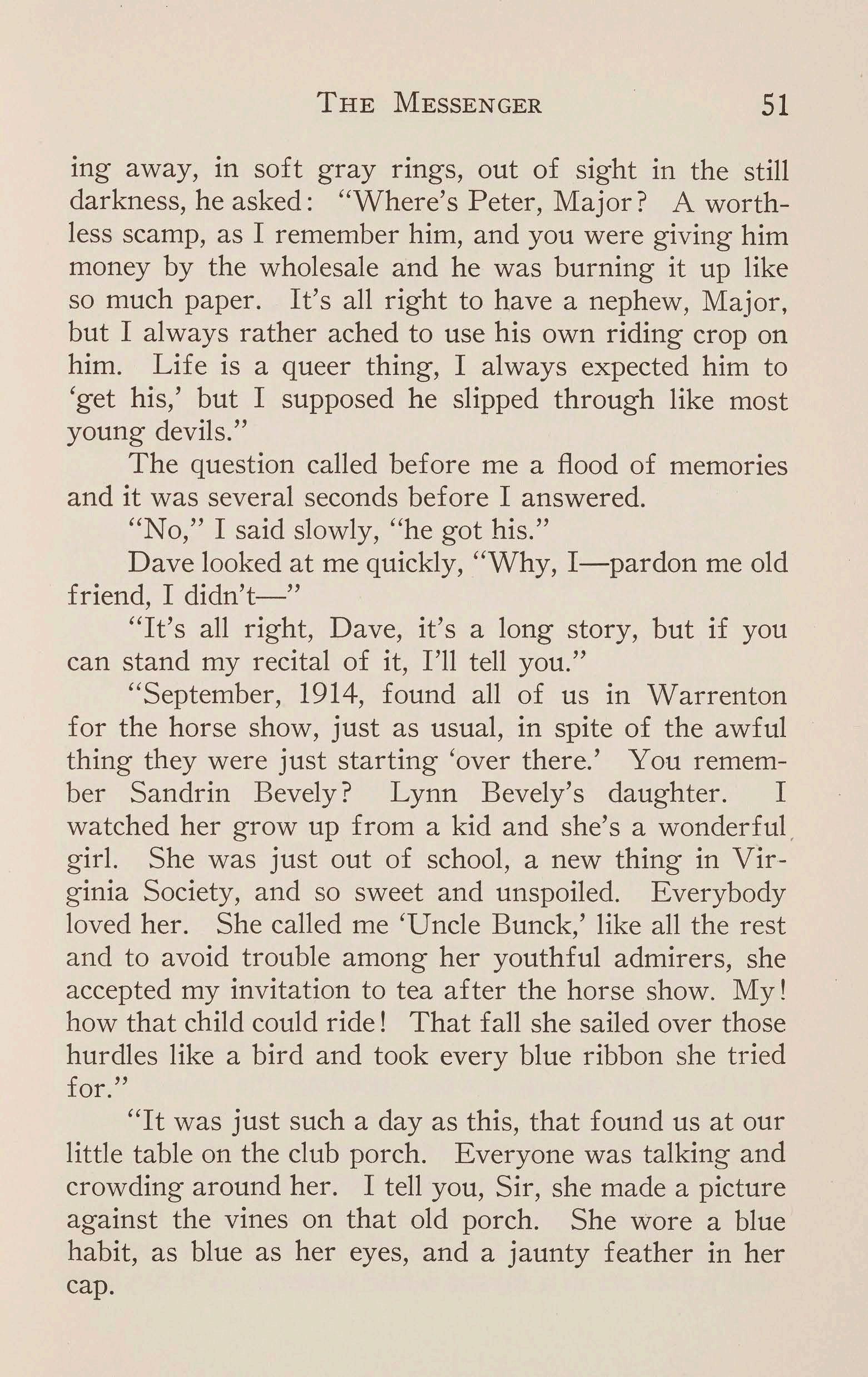
ing away, in soft gray rings, out of sight in the still darkness, he asked: "Where's Peter, Major? A worthless scamp, as I remember him, and you were giving him money by the wholesale and he was burning it up like so much paper. It's all right to have a nephew, Major, but I always rather ached to use his own riding crop on him. Life is a queer thing, I always expected him to 'get his,' but I supposed he slipped through like most young devils."
The question called before me a flood of memories and it was several seconds before I answered. "No," I said slowly, "he got his."
Dave looked at me quickly, "Why, I-pardon me old friend, I didn't-"
"It's all right, Dave, it's a long story, but if you can stand my recital of it, I'll tell you."
"September, 1914, found all of us in Warrenton for the horse show, just as usual, in spite of the awful thing they were just starting 'over there.' You remember Sandrin Bevely? Lynn Bevely's daughter. I watched her grow up from a kid and she's a wonderful , girl. She was just out of school, a new thing in Virginia Society, and so sweet and unspoiled. Everybody loved her. She called me 'Uncle Bunck,' like all the rest and to avoid trouble among her youthful admirers, she accepted my invitation to tea after the horse show. My! how that child could ride! That fall she sailed over those hurdles like a bird and took every blue ribbon she tried for."
"It was just such a day as this, that found us at our little table on the club porch. Everyone was talking and crowding around her. I tell you, Sir, she made a picture against the vines on that old porch. She wore a blue habit, as blue as her eyes, and a jaunty feather in her cap.

"I'm not superstitious, but when I think of that day I always remember the little yellow butterflies that kept flitting by our corner, while she talked of the hundred and one things that popped into her gay little head. It was then that she leaned across the table and tapped my arm with her crop."
"Who is that man, Uncle Bunck?"
"I peered around and out of all those people, I saw Peter. To me he looked like a white elephant, so I looked over his head. I didn't want her to know him, Dave. 'Where and which one, my dear?' I asked.
"The tall man with light hair. See? He's talking to the girl in the gray habit! Why, I do believe he's coming this way."
"He did. He slapped me on the back, pumped my arm up and down and hailed me like old friends meeting after six months' absence.
"Hello, Uncle Bunk, haven't seen you in a month of Sundays. I say, don't monopolize the 'Blue Ribbon Lady.' If you don't introduce me I'll disinherit you right here!" His friends called him "Peter the Great," you know, and I suppose he thought Sandrin would feel his importance. He was accustomed to having women eager for his attentions and her apparent indifference sort of piqued his vanity. I think the only dances he got with her that night were the ones he 'broke.'
"Four months later I was in my apartments in New York. The Bevely's were spending the winter there and of course Peter was on deck. You know how the snow flies there, Dave? One evening I sent my shade to the top of the window and stood looking down on the broad 'White Way.' The snow and sleet beat on the glass and so thickly did it fall that the lights below me were dull points set in a mystic white pattern. A heavy gust
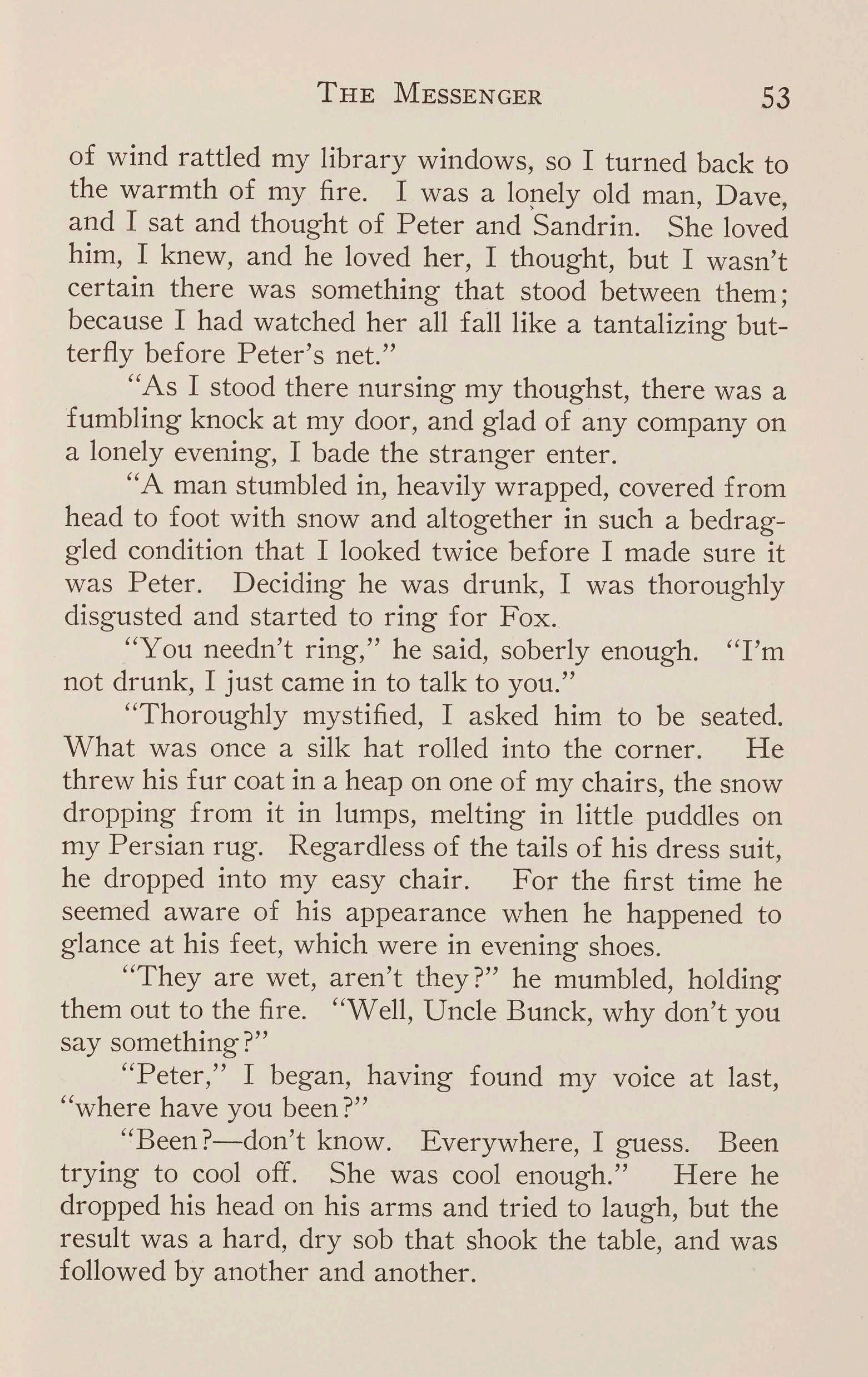
of wind rattled my library windows, so I turned back to the warmth of my fire. I was a lop.ely old man, Dave, and I sat and thought of Peter and Sandrin. She loved him, I knew, and he loved her, I thought, but I wasn't certain there was something that stood between them; because I had watched her all fall like a tantalizing butterfly before Peter's net."
"As I stood there nursing my thoughst, there was a fumbling knock at my door, and glad of any company on a lonely evening, I bade the stranger enter.
"A man stumbled in, heavily wrapped, covered from head to foot with snow and altogether in such a bedraggled condition that I looked twice before I made sure it was Peter. Deciding he was drunk, I was thoroughly disgusted and started to ring for Fox.
"You needn't ring," he said, soberly enough. "I'm not drunk, I just came in to talk to you."
"Thoroughly mystified, I asked him to be seated. What was once a silk hat rolled into the corner. He threw his fur coat in a heap on one of my chairs, the snow dropping from it in lumps, melting in little puddles on my Persian rug. Regardless of the tails of his dress suit, he dropped into my easy chair. For the first time he seemed aware of his appearance when he happened to glance at his feet, which were in evening shoes.
"They are wet, aren't they?" he mumbled, holding them out to the fire. "Well, Uncle Bunck, why don't you say something?"
"Peter," I began, having found my voice at last, "where have you been?"
"Been ?-don't know. Everywhere, I guess. Been trying to cool off. She was cool enough." Here he dropped his head on his arms and tried to laugh, but the result was a hard, dry sob that shook the table, and was followed by another and another.
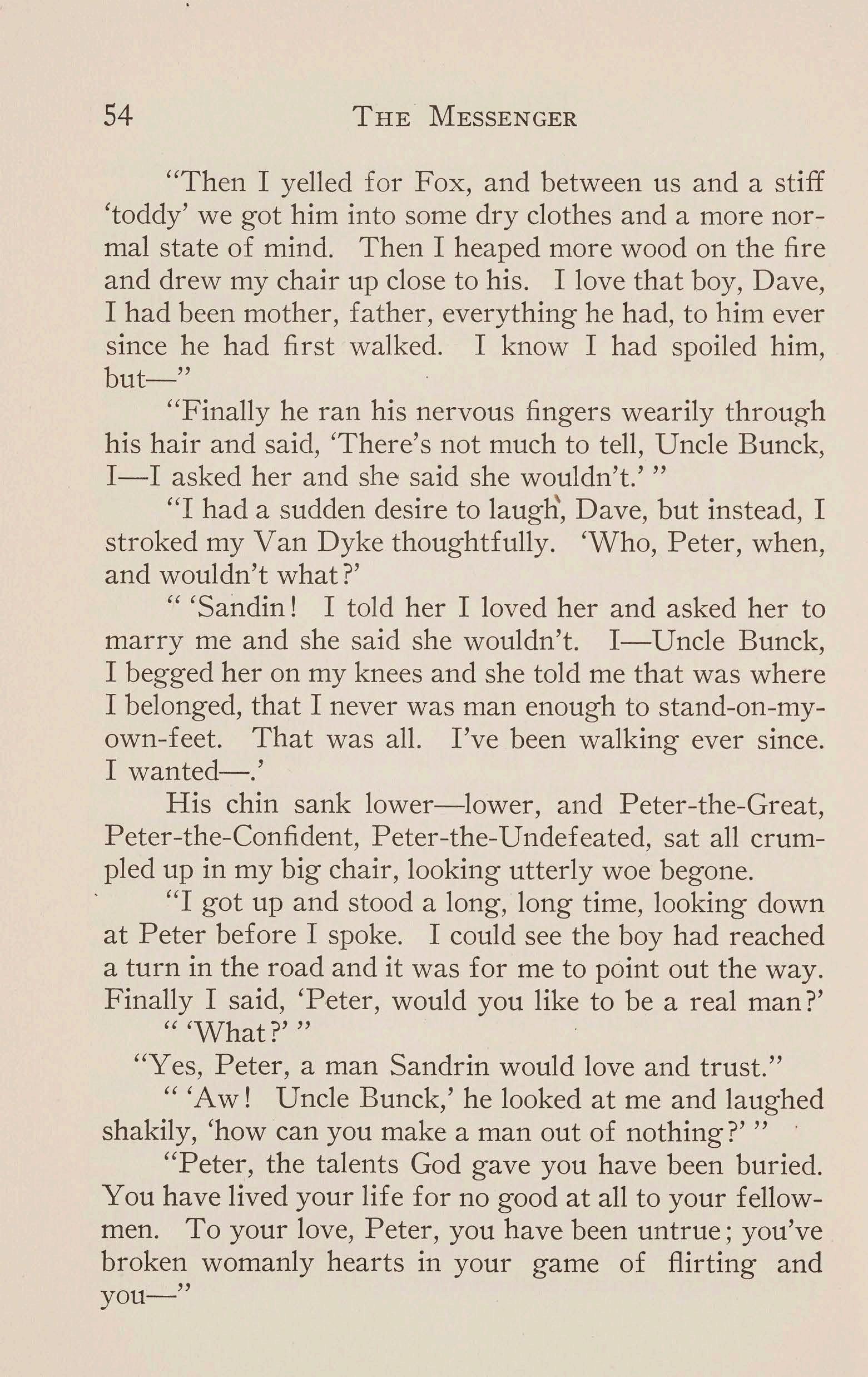
"Then I yelled for Fox, and between us and a stiff 'toddy' we got him into some dry clothes and a more normal state of mind. Then I heaped more wood on the fire and drew my chair up close to his. I love that boy, Dave, I had been mother, father, everything he had, to him ever since he had first walked. I know I had spoiled him, but-"
"Finally he ran his nervous fingers wearily through his hair and said, 'There's not much to tell, Uncle Bunck, I-I asked her and she said she wouldn't.' "
"I had a sudden desire to laugh', Dave, but instead, I stroked my Van Dyke thoughtfully. 'Who, Peter, when, and wouldn't what?'
"'Sandin! I told her I loved her and asked her to marry me and she said she wouldn't. I-Uncle Bunck, I begged her on my knees and she told me that was where I belonged, that I never was man enough to stand-on-myown-feet. That was all. I've been walking ever since. I wanted-.'
His chin sank lower-lower, and Peter-the-Great, Peter-the-Confident, Peter-the-Undefeated, sat all crumpled up in my big chair, looking utterly woe begone.
"I got up and stood a long, long time, looking down at Peter before I spoke. I could see the boy had reached a turn in the road and it was for me to point out the way. Finally I said, 'Peter, would you like to be a real man?'
" 'What?' "
"Yes, Peter, a man Sandrin would love and trust.''
"'Aw! Uncle Bunck,' he looked at me and laughed shakily, 'how can you make a man out of nothing?'"
"Peter, the talents God gave you have been buried. You have lived your life for no good at all to your fellowmen. To your love, Peter, you have been untrue; you've broken womanly hearts in your game of flirting and you-"
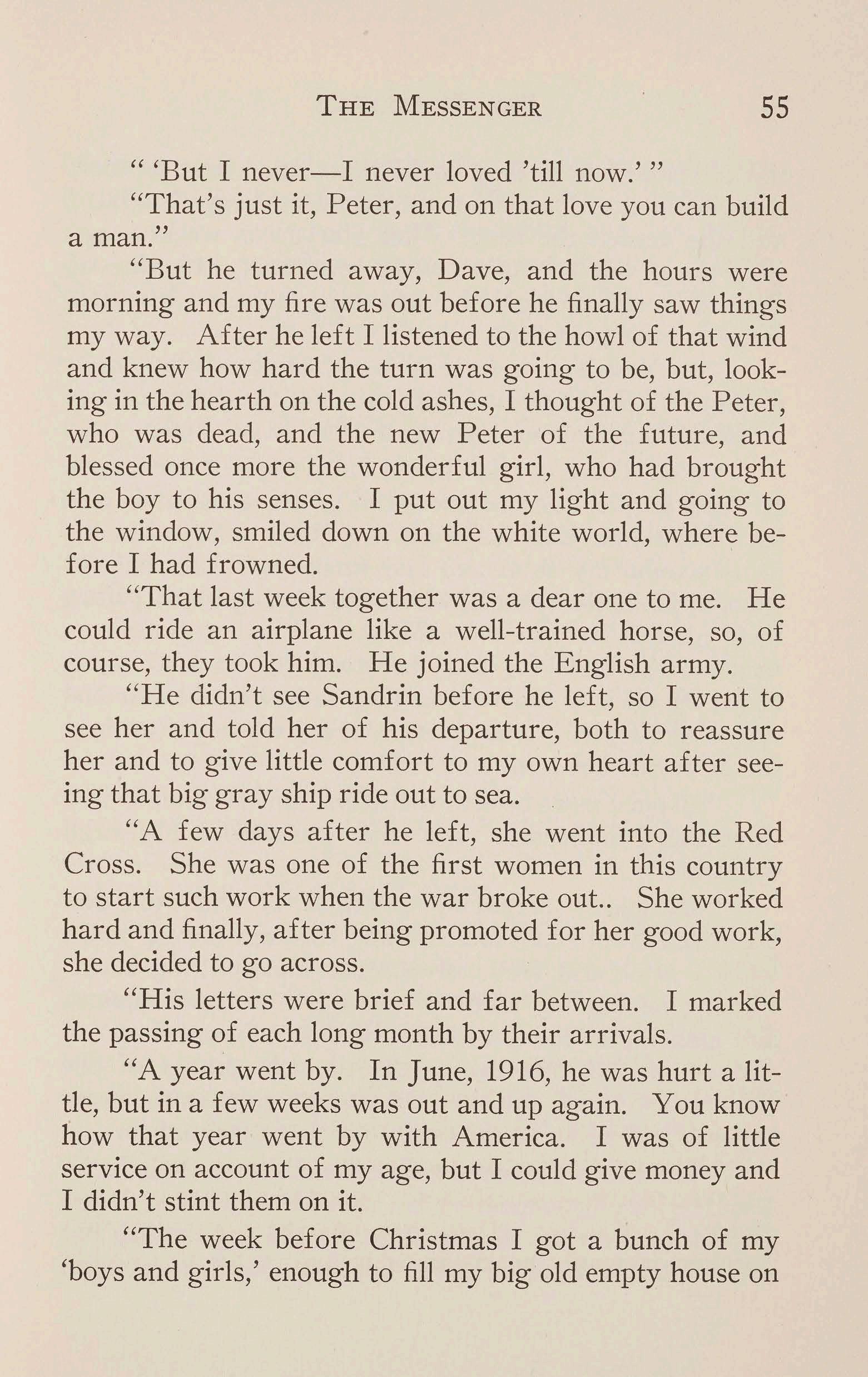
" 'But I never-I never loved 'till now.' " "That's just it, Peter, and on that love you can build a man."
"But he turned away, Dave, and the hours were morning and my fire was out before he finally saw things my way. After he left I listened to the howl of that wind and knew how hard the turn was going to be, but, looking in the hearth on the cold ashes, I thought of the Peter, who was dead, and the new Peter of the future, and blessed once more the wonderful girl, who had brought the boy to his senses. I put out my light and going to the window, smiled down on the white world, where before I had frowned.
"That last week together was a dear one to me. He could ride an airplane like a well-trained horse, so, of course, they took him. He joined the English army.
"He didn't see Sandrin before he left, so I went to see her and told her of his departure, both to reassure her and to give little comfort to my own heart after seeing that big gray ship ride out to sea.
"A few days after he left, she went into the Red Cross. She was one of the first women in this country to start such work when the war broke out.. She worked hard and finally, after being promoted for her good work, she decided to go across.
"His letters were brief and far between. I marked the passing of each long month by their arrivals.
"A year went by. In June, 1916, he was hurt a little, but in a few weeks was out and up again. You know how that year went by with America. I was of little service on account of my age, but I could give money and I didn't stint them on it.
"The week before Christmas I got a bunch of my 'boys and girls,' enough to fill my big old empty house on
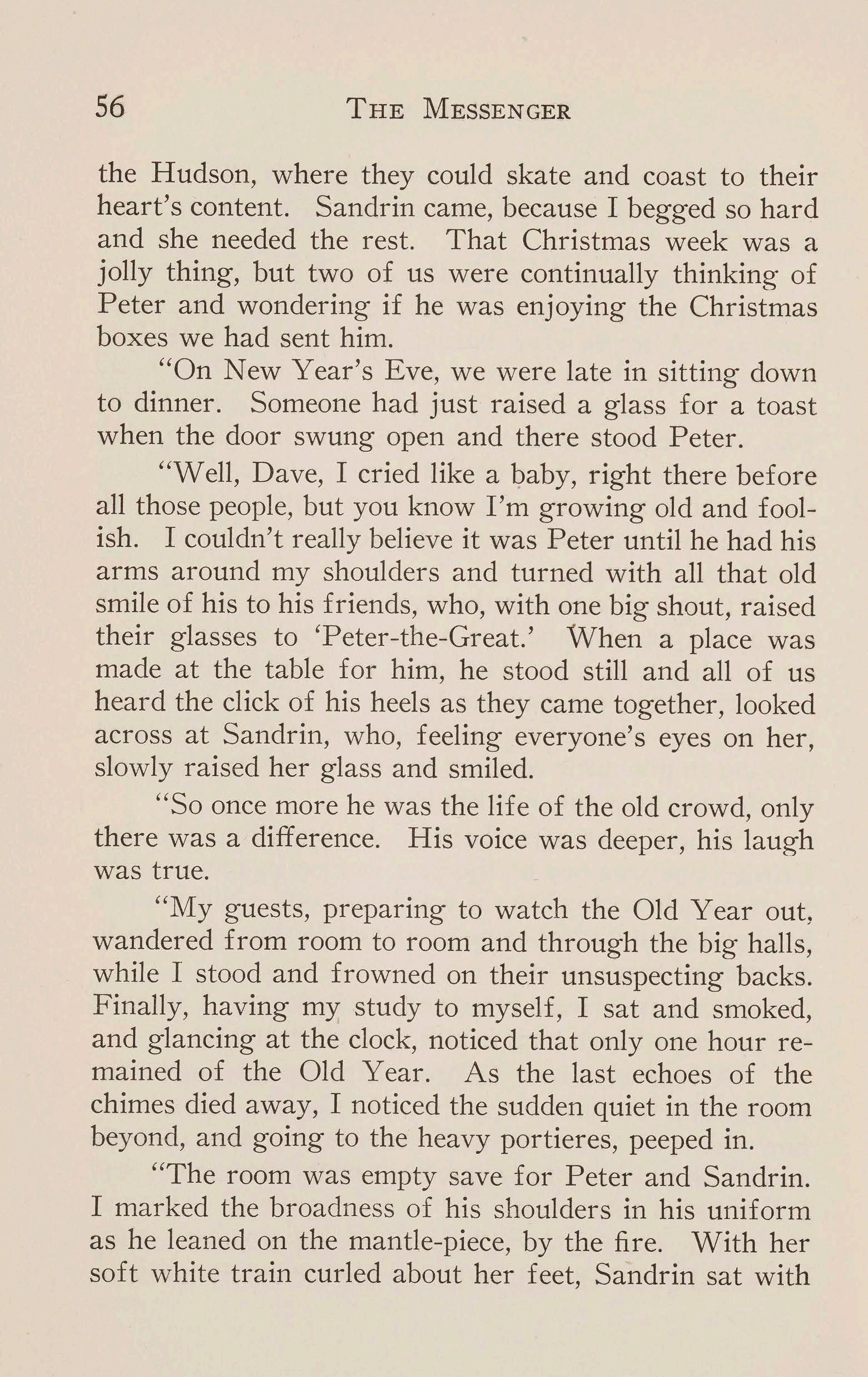
the Hudson, where they could skate and coast to their heart's content. Sandrin came, because I begged so hard and she needed the rest. That Christmas week was a jolly thing, but two of us were continually thinking of Peter and wondering if he was enjoying the Christmas boxes we had sent him.
"On New Year's Eve, we were late in sitting down to dinner. Someone had just raised a glass for a toast when the door swung open and there stood Peter.
"Well, Dave, I cried like a baby, right there before all those people, but you know I'm growing old and foolish. I couldn't really believe it was Peter until he had his arms around my shoulders and turned with all that old smile of his to his friends, who, with one big shout, raised their glasses to 'Peter-the-Great.' When a place was made at the table for him, he stood still and all of us heard the click of his heels as they came together, looked across at Sandrin, who, feeling everyone's eyes on her, slowly raised her glass and smiled.
"So once more he was the life of the old crowd, only there was a difference. His voice was deeper, his laugh was true.
"My guests, preparing to watch the Old Year out, wandered from room to room and through the big halls, while I stood and frowned on their unsuspecting backs. Finally, having my study to myself, I sat and smoked, and glancing at the clock, noticed that only one hour remained of the Old Year. As the last echoes of the chimes died away, I noticed the sudden quiet in the room beyond, and going to the heavy portieres, peeped in.
"The room was empty save for Peter and Sandrin. I marked the broadness of his shoulders in his uniform as he leaned on the mantle-piece, by the fire. With her soft white train curled about her feet, Sandrin sat with
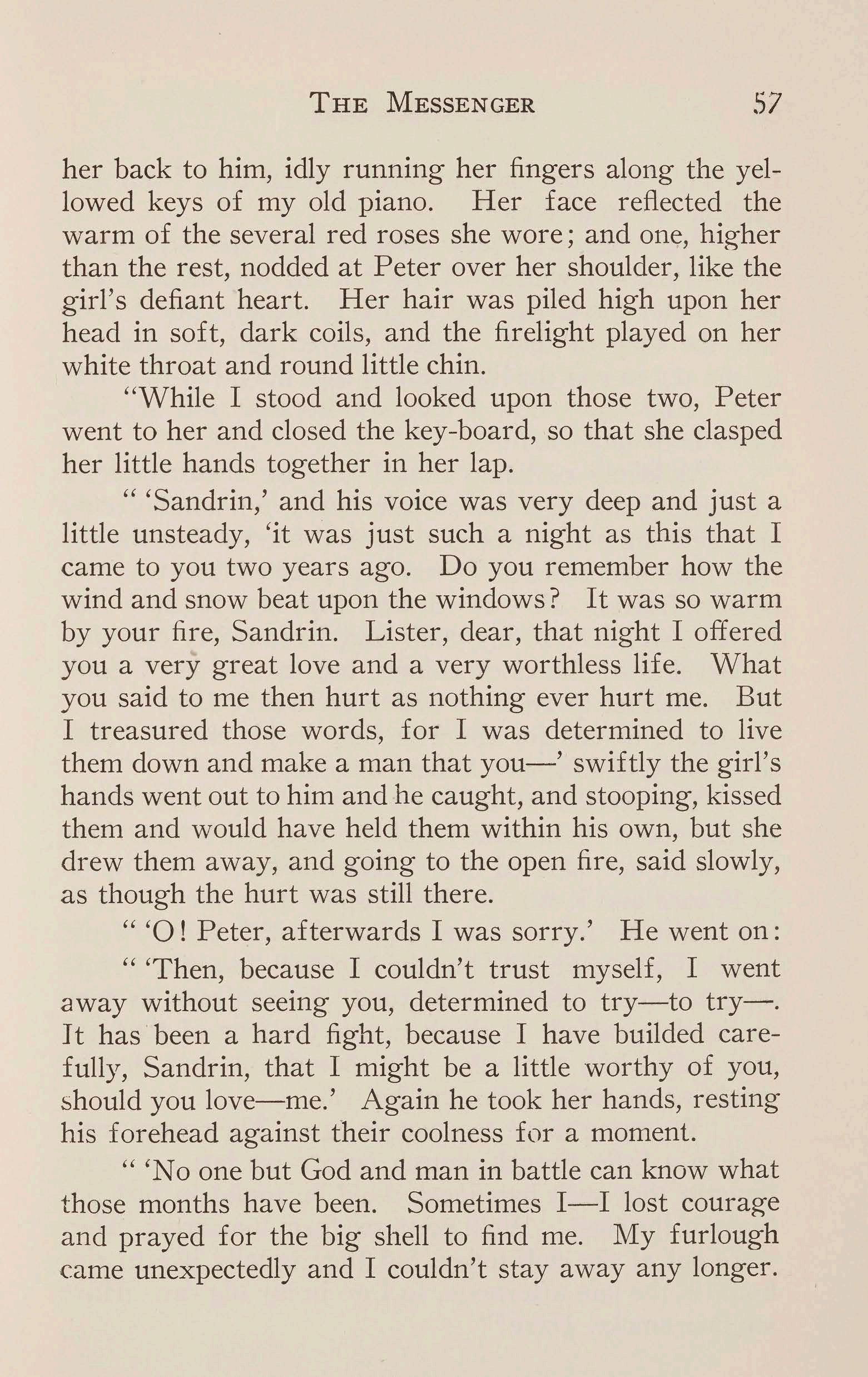
her back to him, idly running her fingers along the yellowed keys of my old piano. Her face reflected the warm of the several red roses she wore; and one, higher than the rest, nodded at Peter over her shoulder, like the girl's defiant heart. Her hair was piled high upon her head in soft, dark coils, and the firelight played on her white throat and round little chin.
"While I stood and looked upon those two, Peter went to her and closed the key-board, so that she clasped her little hands together in her lap.
"'Sandrin,' and his voice was very deep and just a little unsteady, 'it was just such a night as this that I came to you two years ago. Do you remember how the wind and snow beat upon the windows? It was so warm by your fire, Sandrin. Lister, dear, that night I offered you a very great love and a very worthless life. What you said to me then hurt as nothing ever hurt me. But I treasured those words, for I was determined to live them down and make a man that you-' swiftly the girl's hands went out to him and he caught, and stooping, kissed them and would have held them within his own, but she drew them away, and going to the open fire, said slowly, as though the hurt was still there.
" 'O ! Peter, afterwards I was sorry.' He went on:
" 'Then, because I couldn't trust myself, I went away without seeing you, determined to try-to try-. It has been a hard fight, because I have builded carefully, Sandrin, that I might be a little worthy of you, should you love-me.' Again he took her hands, resting his forehead against their coolness for a moment.
"'No one but God and man in battle can know what those months have been. Sometimes I-I lost courage and prayed for the big shell to find me. My furlough came unexpectedly and I couldn't stay away any longer.
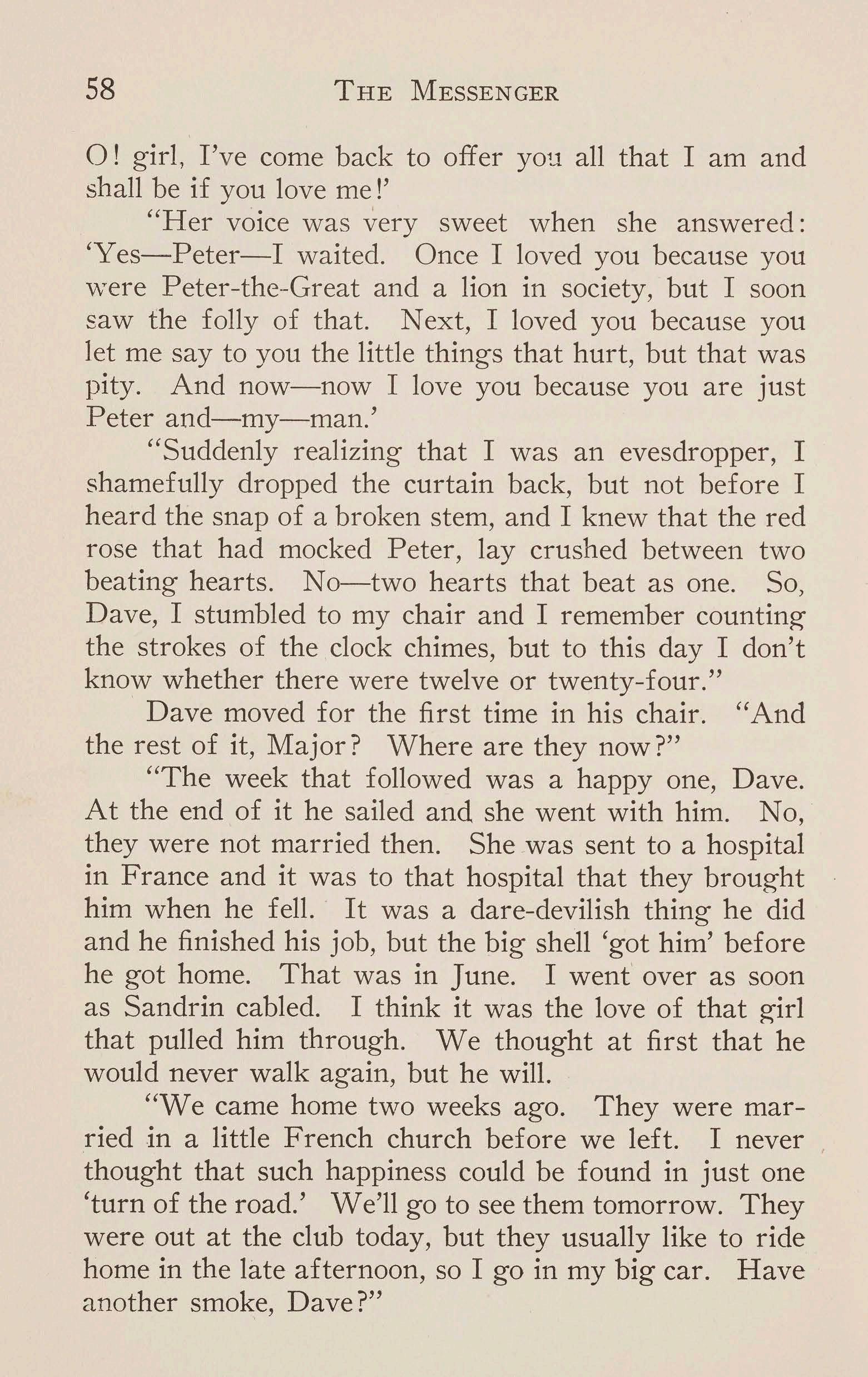
0 ! girl, I've come back to offer yo1..1all that I am and shall be if you love me!'
"Her voice wa s very sweet when she answered : 'Yes-Peter-I waited. Once I loved you because you were Peter-the-Great and a lion in society, but I soon saw the folly of that. Next, I loved you because you let me say to you the little things that hurt, but that was pity. And now-now I love you because you are just Peter and-my-man.'
"Suddenly realizing that I was an evesdropper, I shamefully dropped the curtain back, but not before I heard the snap of a broken stem, and I knew that the red rose that had mocked Peter, lay crushed between two beating hearts. No-two hearts that beat as one. So, Dave, I stumbled to my chair and I remember countingthe strokes of the clock chimes, but to this day I don't know whether there were twelve or twenty-four."
Dave moved for the first time in his chair. "And the rest of it, Major? Where are they now?"
"The week that followed was a happy one, Dave. At the end of it he sailed and she went with him. No, they were not married then. She was sent to a hospital in France and it was to that hospital that they brought him when he fell. It was a dare-devilish thing he did and he finished his job, but the big shell 'got him' before he got home. That was in June. I went over as soon as Sandrin cabled. I think it was the love of that g-irl that pulled him through. We thought at first that he would never walk again, but he will.
"We came home two weeks ago. They were married in a little French church before we left. I never thought that such happiness could be found in just one 'turn of the road.' We'll go to see them tomorrow. They were out at the club today, but they usually like to ride home in the late afternoon, so I go in my big car. Have another smoke, Dave?"

You get pleasure out of reading "The Messenger" and the University benefits from its publication. We appreciate your attempt to repay this by subscribing, but the sum needed each month to get out the magazine is almost as large as the total amount of subscriptions. This balance has to be met with advertising.
We refuse to believe that advertising with University of Richmond publications is charity. We argue to that effect with prospective advertisers. Now, if the publications wish to hold up their end of the bargain and make advertising in them a businesslike arrangement, it is the duty of the students to deal with those firms whose advertisements appear in the publications.
Read thru the pages that follow; pick out the business houses whose services you can use, and when you get a chance to buy from one of them, do so. Tell them you're from the University of Richmond and you appreciate their co-operation. Trade with those who trade with you.
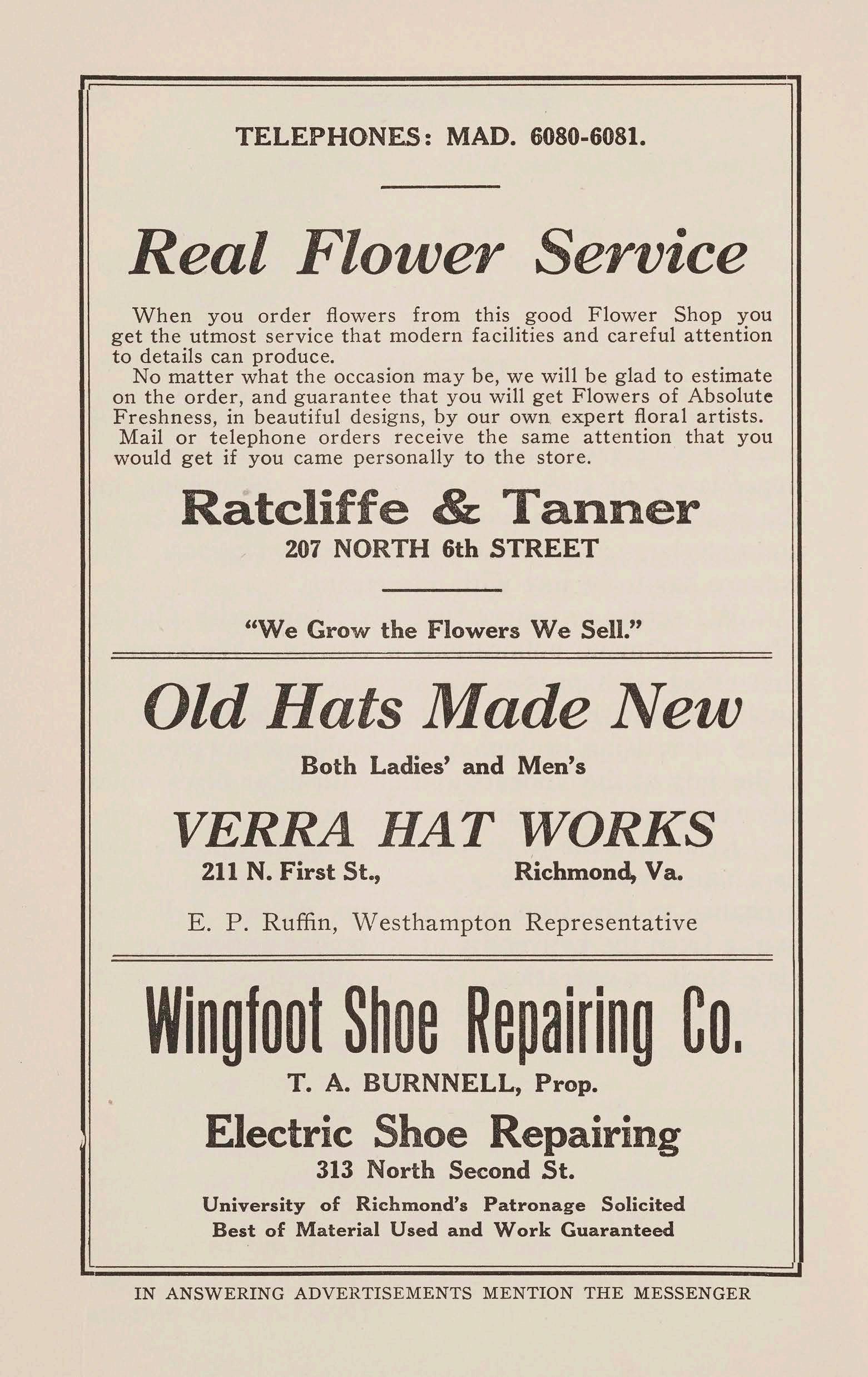
When you order flowers from this good Flower Shop you get the utmost service that modern facilities and careful attention to details can produce.
No matter what the occasion may be, we will be glad to estimate on the order, and guarantee that you will get Flowers of Absolute Freshness, in beautiful designs, by our own . expert floral artists. Mail or telephone orders receive the same attention that you would get if you came personally to the store.